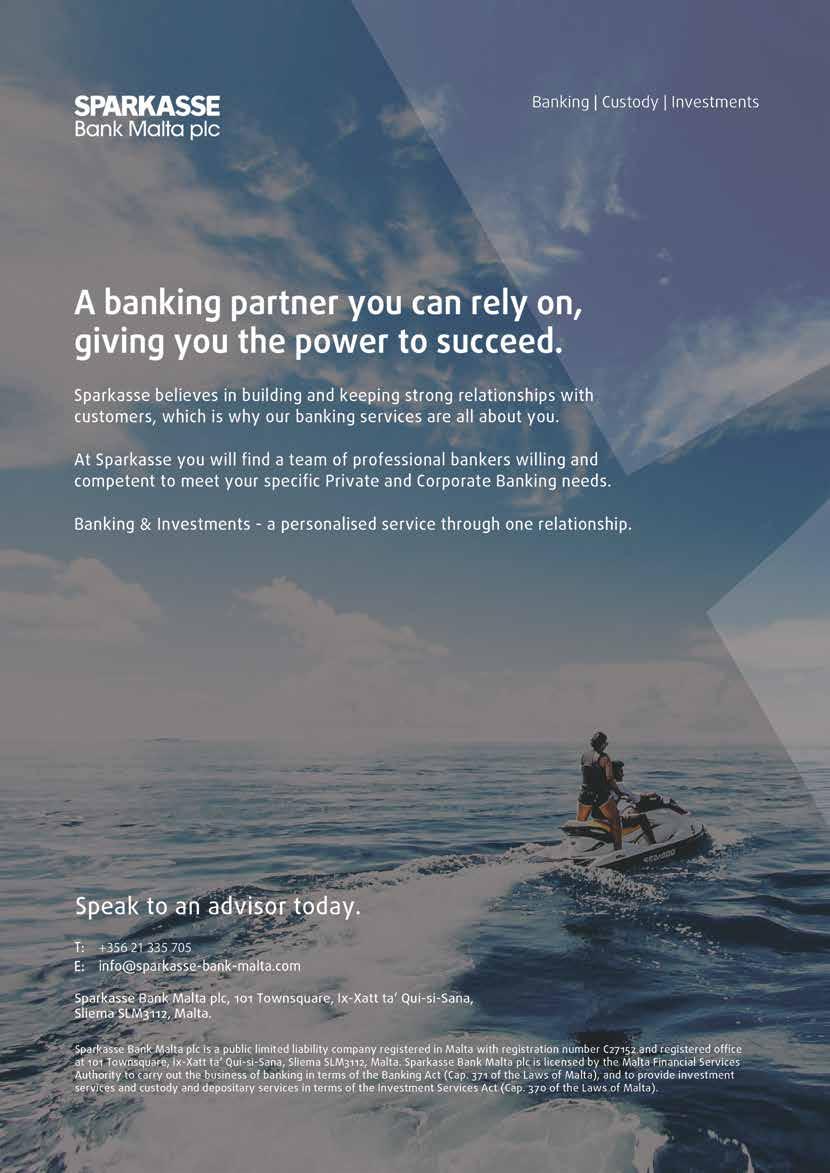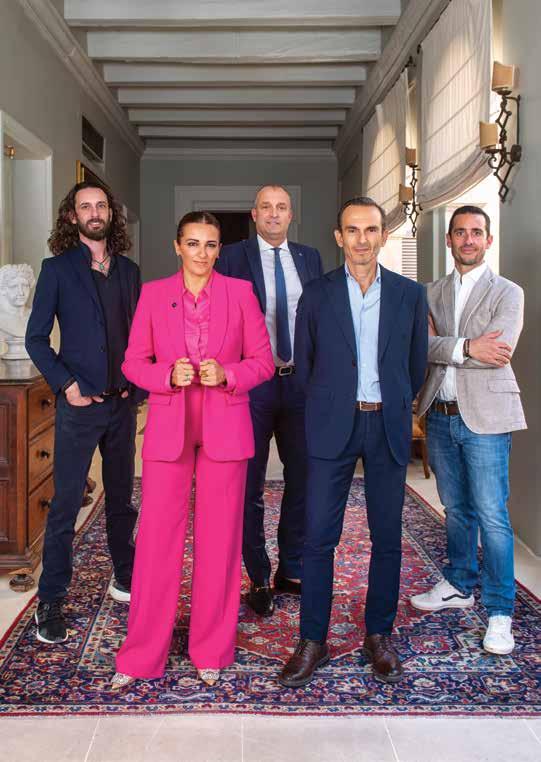


Business Now Winter 2022 / 2023 Interview Business veteran Joseph Zammit Tabona shares his story 30 Interview Rafel Sammut on empathy in business 36 Malta’s Most Beautiful Businesses The Cisk Tap: From concept to completion Official Partners 48 Cover Story Industry leaders attempt the impossible task of predicting 2023 Industry Greats Carmelo Abela Marketing’s 90-year legacy 72
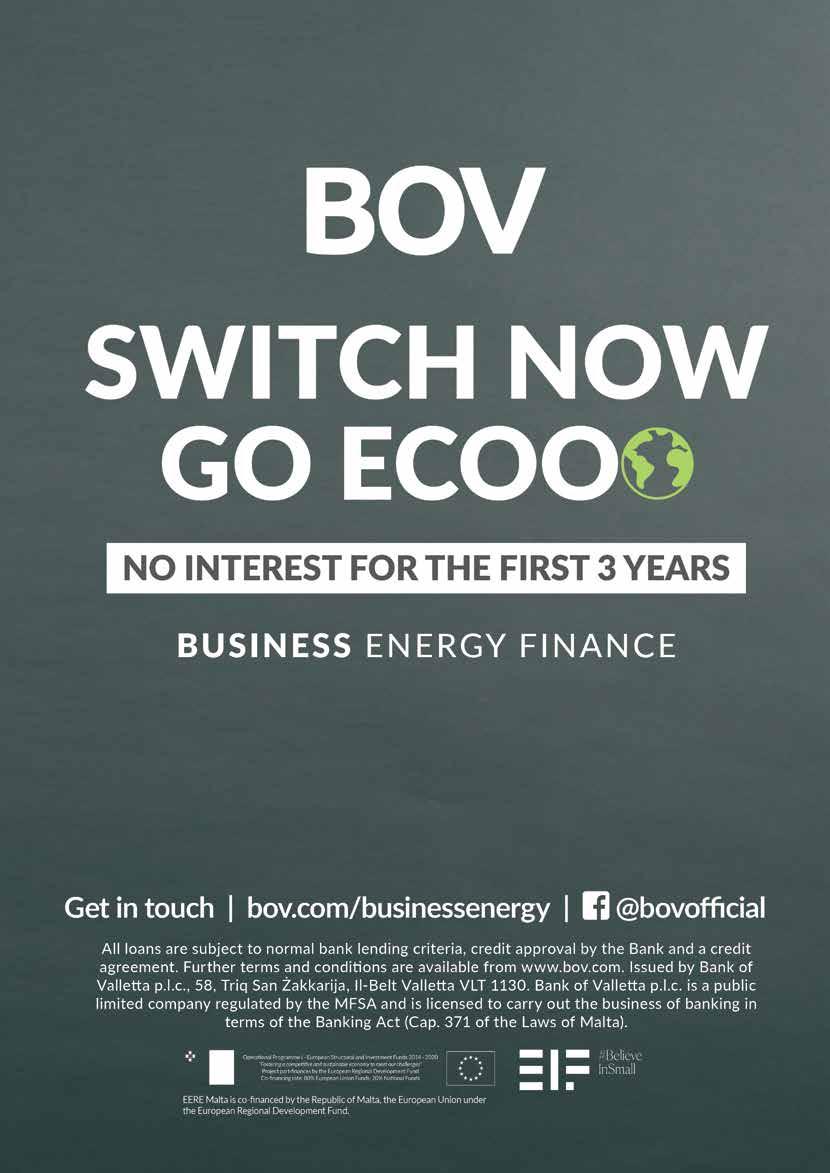
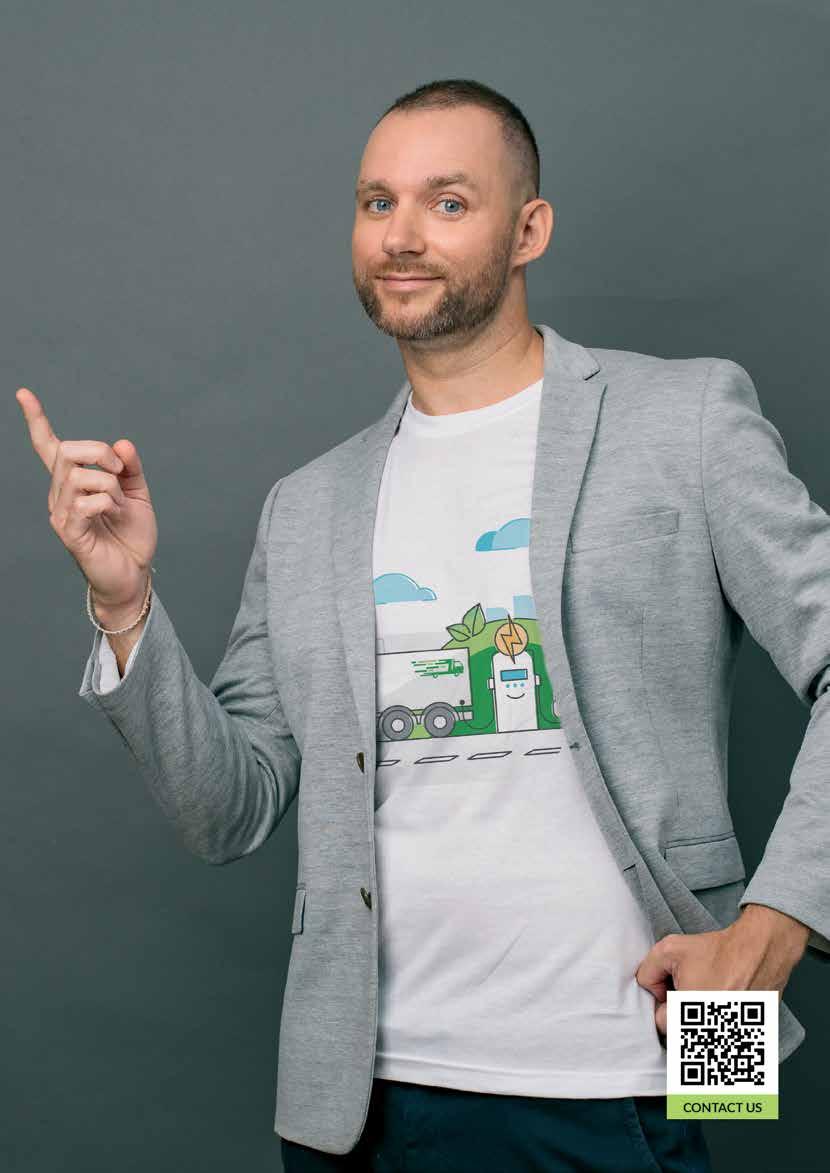






Interview
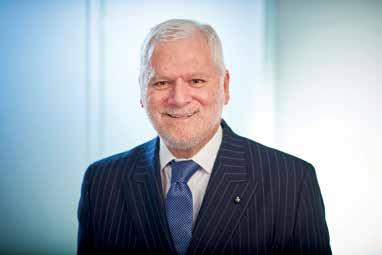
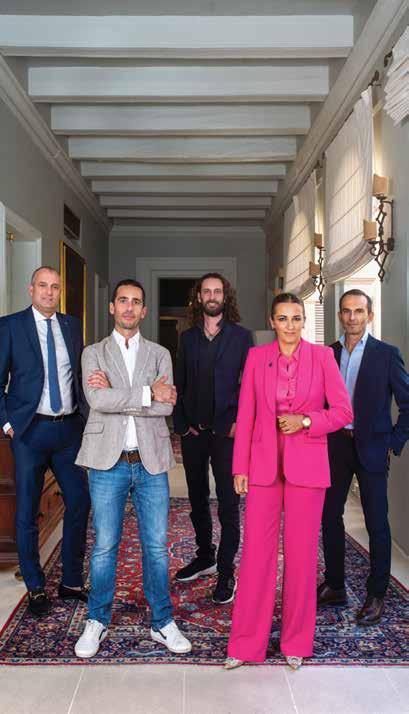
10 BusinessNow Contents
‘I ALWAYS CLASSIFY MYSELF
PERSON, THOUGH I HAVE ALWAYS WORKED HARD THROUGHOUT MY LIFE’ Business veteran Joseph Zammit Tabona shares the inspiring story of his long and decorated career on the islands and beyond with
Interview THE POWER OF COMPASSION Restaurateur and Founder of the Victory Kitchen Rafel Sammut speaks to Rebecca Anastasi about how empathy lies at the heart of his business and charitable endeavours. 36
tents 14 Cover Story THE FORECAST FOR 2023: CAN WE PREDICT WHAT LIES AHEAD? As interest rates rise, supply chains falter, and a war rages on the European continent, Rebecca Anastasi asks five business leaders for their insights on what 2023 will bring. Business Now
AS A LUCKY
Sarah Muscat Azzopardi
con
Malta’s Most Beautiful Businesses A HOME FOR MALTA’S HERITAGE HOPS
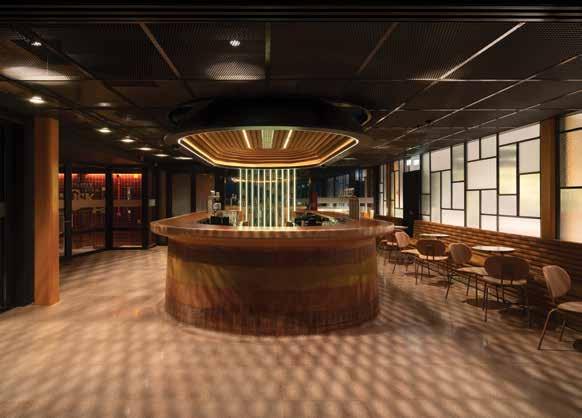


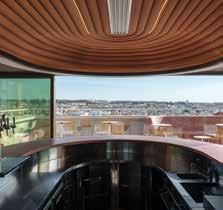
Industry Greats
BUILDING A SUSTAINABLE FUTURE ON A 90YEAR LEGACY
Martina Bartolo Parnis meets brothers and Directors, Steve and Pierre Abela, to find out about Carmelo Abela Marketing’s origins, its evolution and its plans for the future.

Meet The Artist
A JOURNEY OF DISCOVERY
Sarah Muscat Azzopardi delves into the artistic world of Wallace Falzon, and how each piece is a form of internal expression to the artist, for whom art is akin to therapy.
86 Food & Drink
A TASTE OF HOME
11 w BusinessNow Contents
48
Openworkstudio’s Alberto Miceli-Farrugia and Marta Lombardi talk to Rebecca Anastasi about the inception and the communal philosophy behind the design of The Cisk Tap, the home of Malta’s much-loved brew.
72 78
Sarah Muscat Azzopardi visits four local traditional eateries spread around Malta and Gozo that consistently deliver on genuine fare.
Editorial

12 BusinessNow Editorial
THIS WINTER EDITION OF BUSINESS NOW BEGINS
BY ATTEMPTING THE IMPOSSIBLE: predicting what 2023 will bring for local business.
In a post-COVID-19 scenario –and with the backdrop of a war on the European continent – Malta’s economy continues to gather pace in its recovery from the onslaught of the global pandemic. But will the staggering inflation, supply chain issues, global energy crisis, rising salaries and cost-cutting in public spending begin to bite in 2023? We pick the brains of five leading industry figures for their take.
And while looking towards the future is imperative, celebrating our past also forms an important part of this issue, as we take a look at the interesting story of one of Malta’s oldest food importation companies, as well as chart the career of leading industry veteran, Joseph Zammit Tabona.
Elsewhere, we champion triumphs in local commercial design by taking a look at the recently completed Cisk Tap within the iconic Farsons; learn about the inspiring philanthropic efforts of restaurateur Rafel Sammut; and whet our appetite as we discover four exceptional low-profile traditional eateries spread around Malta and Gozo’s villages.
Rounding off this edition, we step into artist Wallace Falzon’s journey of selfdiscovery through art.
Enjoy the issue, Sarah Muscat Azzopardi

PUBLISHER
Content House Group 3, Level 2, Mallia Buildings Triq in-Negozju, Zone 3, Central Business District, Birkirkara CBD 3010 Tel: 2132 0713 info@contenthouse.com.mt www.contenthouse.com.mt
EDITOR Sarah Muscat Azzopardi
HEAD OF SALES & BUSINESS DEVELOPMENT
Marie Claire Camilleri
OPERATIONS AND ACCOUNTS MANAGER
Sue Ann Pisani
CREATIVE DIRECTOR & DESIGN
Nicholas Cutajar

COVER PHOTO
Alan Carville
Shot on location at The Xara Palace
Relais & Châteaux, Mdina
FOLLOW US ON
Content House Group would like to thank all the protagonists, contributors, partners, advertisers and the creative project team that have made this publication a success.
Articles appearing in this publication do not necessarily reflect the views of Content House Group. All rights reserved. Reproduction in whole or in part without written permission of the publishers is strictly prohibited.
Business Now is the largest business magazine of its kind published by Content House Group, one of Malta’s largest media organisations. Business Now Magazine is the sister brand of businessnow.mt, Malta’s fastest-growing business news portal. This publication is distributed to leading companies and businesses operating in different sectors including those in the services sector, manufacturing, retail, ICT and software development, importation, shipping and freight, recruitment, accountancy and audit, corporate and legal, communications, new technology, and many more.
Business Now’s exclusive distribution network also reaches leading CEOs and business leaders. The business magazine is also distributed to creative and marketing agencies, Government ministries, departments and entities, embassies and consulates, banks, and architecture firms, as well as to car showrooms, business centres and yacht marinas. Beyond the free distribution network, Business Now is also available at leading newsagents around Malta.
13 BusinessNow Editorial
The forecast for 2023: Can we predict what lies ahead?
While the last 12 months have seen Malta’s economy retain its steady course, the constantly evolving financial and geopolitical situation may create a domino effect which will impact the island as we head into the new year. As interest rates rise, supply chains falter, and a war rages on the European continent, what does 2023 look like? Rebecca Anastasi asks five business leaders for their insights.

14
BusinessNow Cover Story
PHOTOS
BY ALAN CARVILLE. LOCATION: THE XARA PALACE RELAIS & CH ÂTEAUX, MDINA
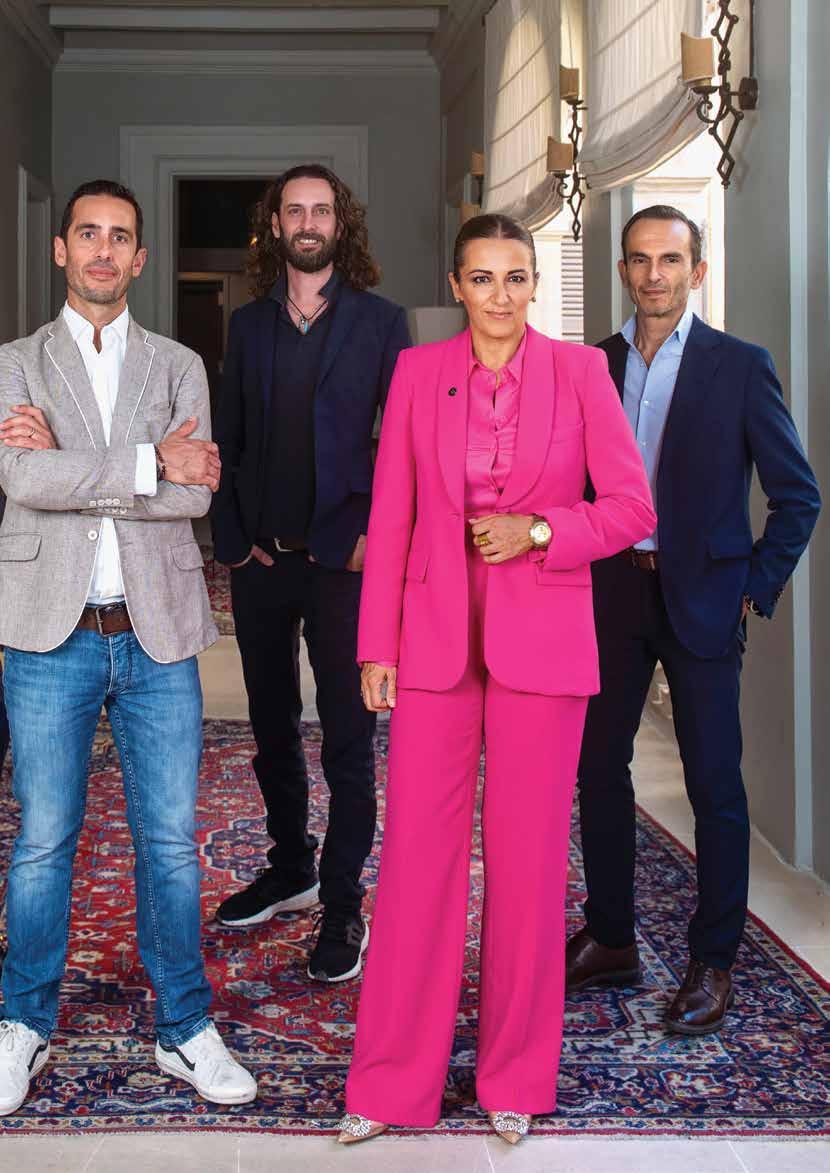
15 BusinessNow Cover Story
can look to next year with cautious optimism and a return to a sustainable tourism industry”
Alex Incorvaja is the General Manager of the Malta Marriott Hotel & Spa. He boasts over 30 years of international hospitality and tourism industry experience, and was, previously, at the helm of the Malta Tourism Authority’s office in London.
For Alex Incorvaja, 2023 may bring along its challenges, but the crises rocking the globe over the past few years have resulted in productive shifts of perspective. “I believe the pandemic has reminded us of what a fantastic industry we work in,” says Alex Incorvaja, in his assessment for what lies ahead over the next 12 months. “The recovery has made us more appreciative of how rewarding it is to work in the hospitality sector, where we have started to see travel return to what we knew it as pre-2020.”
Indeed, he says, looking ahead, “tourist arrivals to Malta are largely expected to rebound to pre-COVID record levels over the next 12 to 18 months, as we see the flight network of routes and frequencies increase in the coming months to reach 2019 numbers. Connectivity is key for Malta’s recovery,” he says, although he adds that “airline seat capacity is still hovering around 80 per cent compared to 2019 levels.”
Whilst this 20 per cent can be regarded as marginal, he continues, the drop in capacity is far greater from the UK and Germany (with other smaller, secondary markets absorbing these more significant shortfalls). “However, these two feeder markets are the most important geographic contributors to five-star hotels, as guest spend is higher;
the countries are also major hubs for transatlantic connectivity and are crucial for the meetings and incentive market, a segment which hotels like the Malta Marriott rely on in the low and shoulder season months.” Despite this, there are signs to be hopeful, for, “with the prospect of Malta’s most important source markets levelling out to 2019 levels in terms of seat capacity as of quarter two in 2023, we can look to next year with cautious optimism and a return to a sustainable tourism industry,” he asserts.
Ensuring the survival of Malta’s national airline is imperative, in his view, for this outlook to remain strong. “Air Malta is part of our national identity, a selling point to the islands and one that has made tourism one of the largest and most important economic contributors to Malta’s GDP over the years. It also serves some of Malta’s most important routes and hubs, with frequencies that other airlines don’t necessarily offer throughout the year. This is crucial for all segments, be it corporate, leisure or group travel,” he asserts.
Moreover, Mr Incorvaja stresses the importance of amassing the required human resources in Malta. This is one of the most pressing matters to address, he says. “The exodus of talent from the industry during

16
“We
BusinessNow Cover Story
the pandemic has left us with tremendous obstacles to deliver our promise to guests,” he explains. “We have not only seen this within hotels, but also across the aviation, airport, and food and beverage sectors. A shortage of supply in the labour market, both locally and from within the EU, has led us to rely on third-country nationals –which is fine, as there is a superb pool of talent from these parts of the world. However, the lengthy process and red tape for granting visas is hindering the gap to fill many of the existing vacancies.”
Tourism in Malta must remain competitive, despite these challenges, he continues, though he points out that external factors such as inflation, the energy crisis, and the increase in the cost of labour “have to be factored into our operation and somehow need to be absorbed into our pricing structure. Value for money therefore remains key to our success,” he says. This applies both “at property level” – at the Marriott itself – and in Malta and Gozo, as a whole. “These are global challenges and not just unique to Malta, so therefore, I believe that travellers will expect to pay more for their travels. Yet this will only happen if we provide value for money in a global competitive marketplace.”
The General Manager is, indeed, ensuring the hotel is geared up for this reality. “Being part of Marriott International’s global travel programme Bonvoy (with Marriott Hotels being one of the most recognised of its portfolio’s 30 diverse brands), Malta Marriott – following its €30 million renovation and rebranding programme in 2018/9 – is set to achieve far greater visibility and leverage from the programme’s 160 million+ loyal members, including the North American market This, as we are already seeing, is giving the hotel, and of course Malta, a great opportunity to attract more travellers from this part of the world,” he states.
Summing up, he is confident in the resilience of the Maltese economy, and the tourism industry, in particular, since travel will “hopefully remain an essential commodity for both leisure and business travellers in 2023 and beyond.”
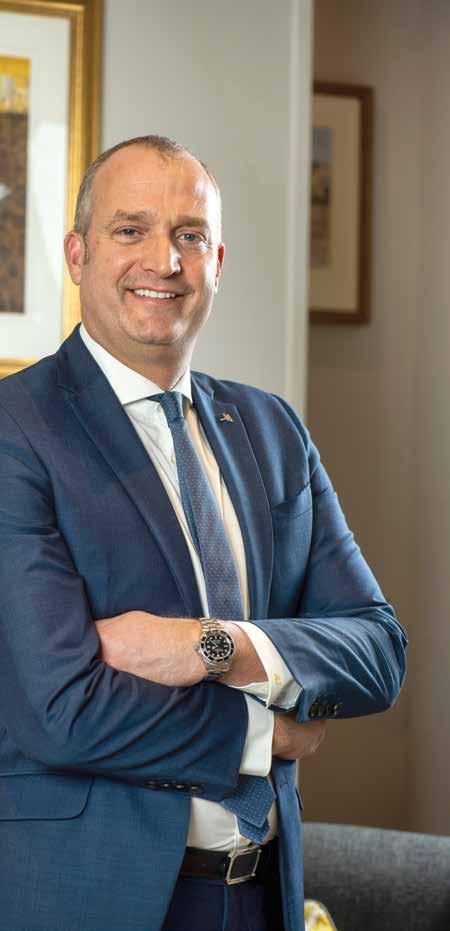
17
BusinessNow Cover Story
“The recovery has made us more appreciative of how rewarding it is to work in the hospitality sector.”
Claire Zammit Xuereb is the Hospitality and Care Director for AX Group, managing a portfolio of seven hotels and 13 restaurants, including the five-star Rosselli AX Privilege luxury hotel in Valletta, the five-star AX The Palace in Sliema, and the Michelin-awarded Grain brand including Bib Gourmand Grain Street and One Star Under Grain, also in the capital.
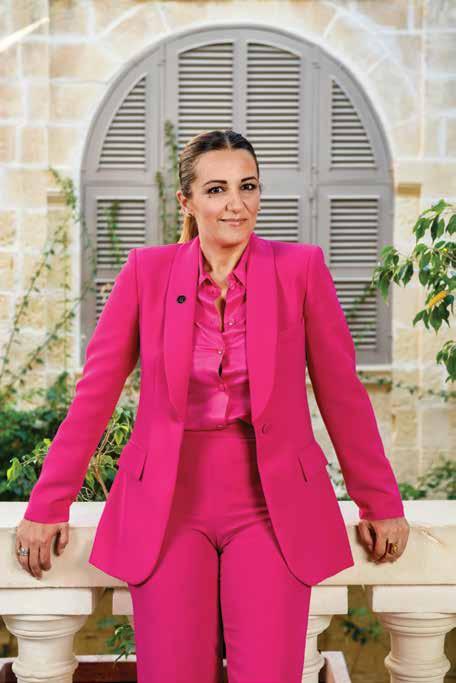
“2023 is among the most difficult to predict, due to the ever-changing conditions of demand and supply,” Claire Zammit Xuereb says. As testament to this, she points to the expected challenges in accessing the appropriate human resources in Malta, as well as supply chain and transport issues, coupled with evolving trends or habits – all of which are, and are expected to continue having, a ripple effect on the economy, she insists.
“Post COVID is transpiring to be unexpectedly among the most difficult periods of our business, as its dynamics changed completely, on all levels, starting with the scarcity of human resources,” she states, echoing the comments made by Mr Incorvaja. Indeed, she continues, the issues resulting from the lack of talent are compounded by the decline in the quality of human capital available – as a result of lacunae in education, and the failure to attract the ‘right’ candidates – and the rising cost of salaries, making the ability to find, keep and pay good staff increasingly problematic.
Moreover, “it is also very tough to predict business trends, making it more complex for us to determine not only sales levels, due to the fluctuations on the market, but also to determine price expectations, due to the ever-increasing cost of living.” In addition, in terms of the team at AX Group, “it’s very challenging to retain staff due to the fragility of the situation, and, therefore, the need to constantly mentor and be closer to them is even greater.”
In this regard, she continues, “we believe that 2023 will be worse than 2022 in terms of rising costs, so businesses need to not only revise their plans but re-think the way they operate. Possibly, one needs to revise their operations, and tweak them, in order to maintain a good and sustainable business, as well as to remain attractive to the market.”
18 BusinessNow Cover Story
“If you look for opportunities, you will always find them”
Despite this, there is a silver lining, she says: “The change in people’s expectations is also challenging our hotel teams, pushing them to constantly innovate and to keep up with the ever-changing market needs and demands.” Indeed, AX Group has many projects in the pipeline, as 2023 gets underway. “Innovation needs to be stimulated even more than before. It is vital that new projects within our business are encouraged, as this will reassure our relevance to the market. But, we need to work harder towards the viability of each of those businesses and be bold enough to remove what doesn’t make sense anymore, if they cannot be tweaked to today’s needs,” she says. “We need to be agile and brave enough to change our ways.”
To effect this philosophy, and in order to maintain a buoyant business, Ms Zammit Xuereb meets “with top executives on a more frequent basis, and together with their teams, we revise matters in each business unit delving deeply into the operations, procedures and goals of that specific department,” she explains. This has an impact on “how we appeal to the market, how we recruit, how to procure resources, as well as how to stimulate and retain our business.”
With this in mind, Ms Zammit Xuereb’s plans for the company include keeping “very close tabs on what is happening around us and close grips on my team, to constantly adjust our sails to that wind.” Looking ahead, she advises companies working in various sectors to innovate and “develop new products to keep being relevant, as well as to attract a constant flow of business and potentially new segments of the market.” For, she insists, “if you look for opportunities, you will always find them. In an unstable economy, your opportunities are greater, but one needs to be committed to keep innovating, be resilient and look ahead, as we need to pivot around any changes which arise.”
will take leaders across industry who dare to zig, whenever everyone else is trying to zag, to raise the bar”
Peter Grech is the Founder and CEO of BRND WGN, a full-scale creative brand consultancy firm based in Malta. BRND WGN supports entrepreneurs and organisations in their endeavour to create meaningful brands with creativity and vision across all industries.
For Peter Grech, “2023 will continue to test organisational resilience across markets. The brands that make it through will be those that are ready to push the boundaries, inspire and empower their people, as well as stay focused on minimising the impact of rising costs whilst still bringing value to their customer base and, at the same time, retaining brand integrity. It will take leaders across industry who dare to zig, whenever everyone else is trying to zag, to raise the bar,” he asserts.
The biggest difficulties for businesses will be the compendium of issues which lie ahead. “I believe it is the collection of uncertainties that is the most challenging to deal with right now.” Indeed, inflation, supply chain issues, the global energy crisis, rising salaries and cost-cutting in public spending will all “affect our client base and present both threats as well as opportunities. The struggle lies in the balancing act of focusing on the long-term whilst navigating the here and now. Every struggle, however, can be turned into an opportunity with a creative approach – that’s where we come in to support our clients, protecting and strengthening their brands for the long haul,” he explains.
19 BusinessNow Cover Story
“Post COVID is transpiring to be unexpectedly among the most difficult periods of our business, as its dynamics changed completely, on all levels, starting with the scarcity of human resources.”
“It
This builds on the work the firm invested in post-COVID. “2022 was a year of great evolution, development and growth for BRND WGN. We really focused on digging deep as an organisation and forging a collective vision for the future of the WGN. It started by moving to a new HQ at The Brewhouse, investing in the team, particularly our London office, as well as refining our client offering. We also took the time to work on ourselves as people, both in terms of up-skilling but, more importantly, taking the downtime we needed after 24 months of what felt like a never-ending rollercoaster. We’re a very different organisation to who we were pre-pandemic, and we are very proud of what we have achieved,” he asserts.
The biggest focus, in this regard, has been – and will continue to be –supporting the agency’s clientele. “Our success ultimately depends on theirs, and our offering has been adapted to the nature of the current business climate and the seismic digital shift. In fact, today, our advisory team are as busy as our creative and digital teams,” he
explains. This perspective has been informed by the “tough lessons” brought on by COVID, namely: “we need to keep investing in our people, into growing a sustainable business model that allows us to ride any ‘speed bumps’, whilst resuming our growth in a geographically diverse portfolio to mitigate risks,” he says.
Mr Grech also refers to the broader changes which will continue to impact the island’s economy, saying that recent research shows that “the traditional economic drivers of the past will be tested, whilst new business sectors will see an increase in revenue. Agile entrepreneurs will seize the opportunities that arise through these changes but those that don’t are bound to see an imminent decline. This situation is bound to bring about consolidation in some market segments,” he contends. In this light, “the months ahead could also be the right time for setting a new and inspiring long-term vision for Malta, that goes above partisan politics and seeks to establish new and sustainable economic drivers.”
Furthermore, on a company level, and in order to attend to these shifting sands, “companies will realise quicker than ever that today’s market differentiator is not only price, but rather a balance of value, quality, convenience and customer experience, locked in with brand reputation. Brands need to communicate honestly with their stakeholders to generate brand loyalty, and protect and grow market share. We will be there to support brand leaders through that change,” he concludes.
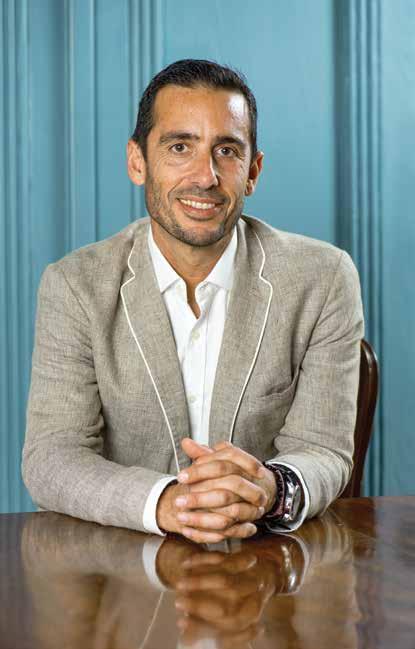
20 BusinessNow Cover Story
“The traditional economic drivers of the past will be tested, whilst new business sectors will see an increase in revenue.”
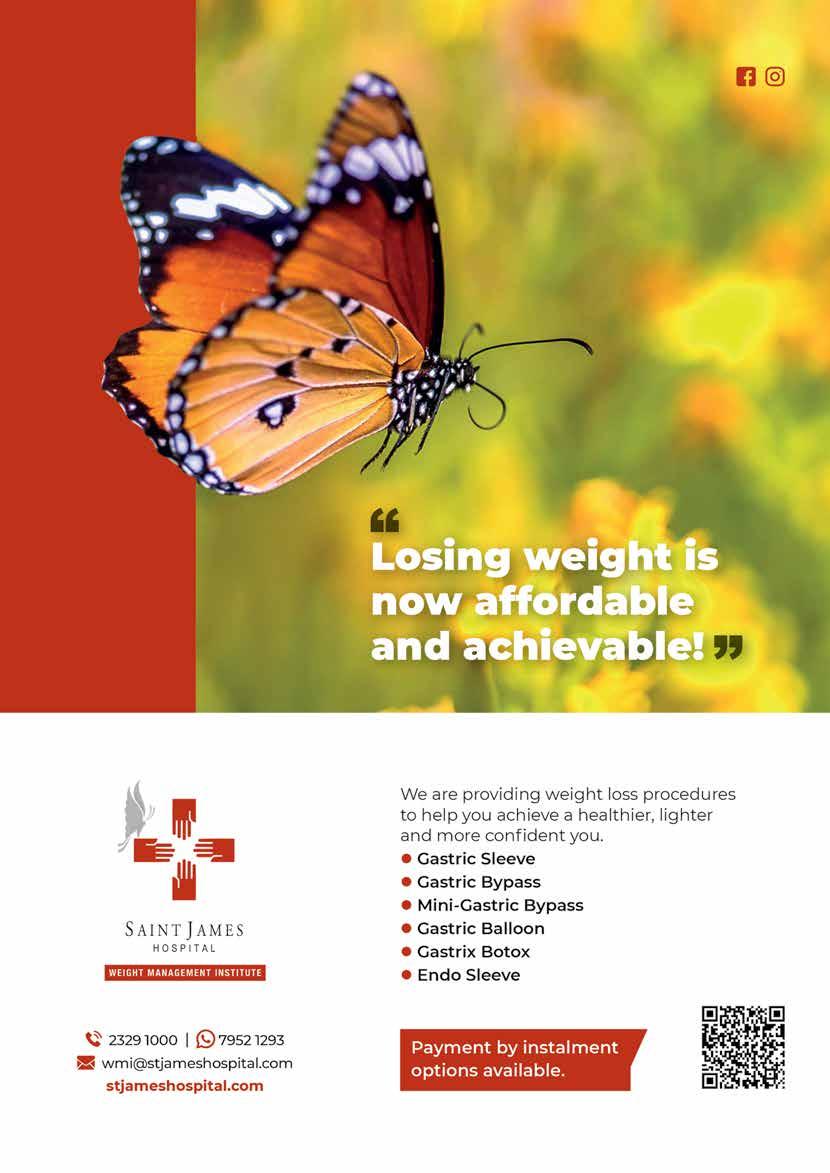
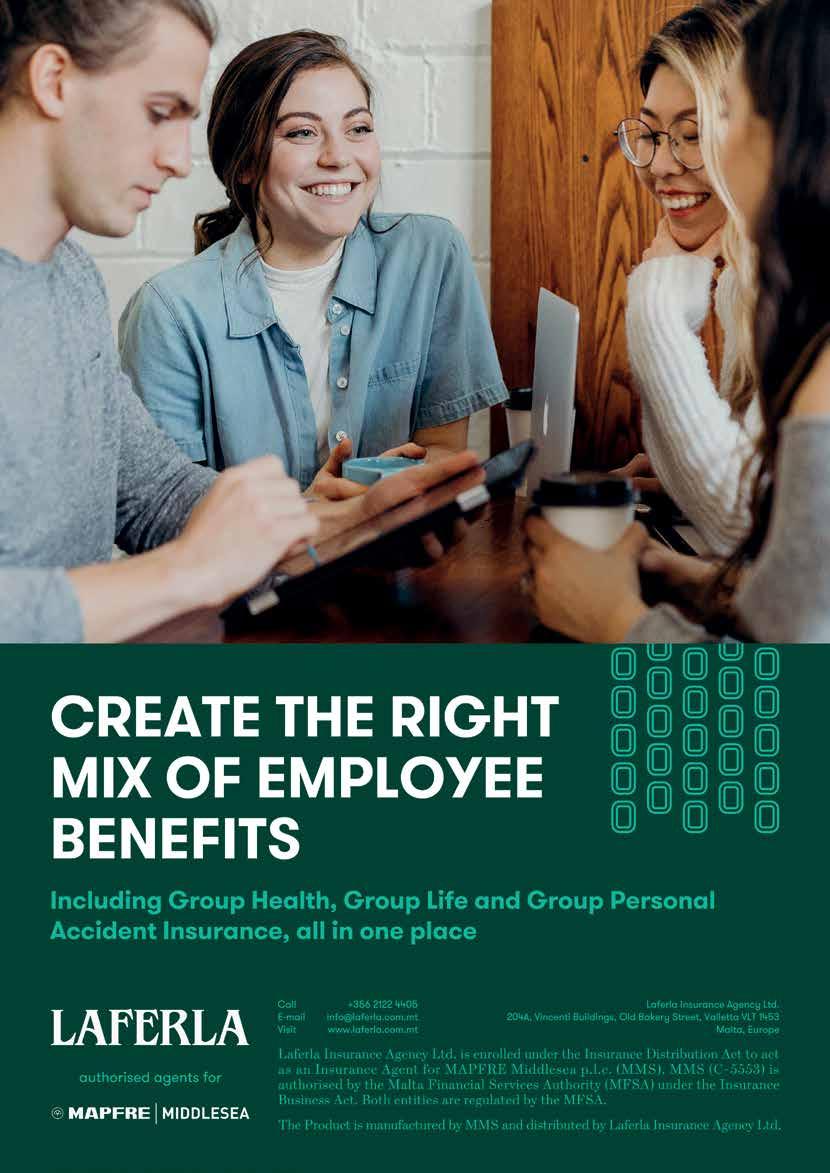
will need to prepare themselves to be able to deal with the changing landscape”
Norman Aquilina is the Group Chief Executive of Simonds Farsons Cisk plc, a position he has held since 2010. He forms part of the Council and Board of Management of The Malta Chamber of Commerce, Enterprise and Industry, and previously held the post of Senior Vice-President, apart from also being a former Chairman of the Chamber’s Manufacturers Economic Group.
“I expect 2023 to be a rollercoaster year,” Norman Aquilina affirms. “With a tall order of ongoing challenges, along with the anticipated turbulence, businesses will need to prepare themselves to be able to deal with the changing landscape. They will, more than ever before, need to plan and clearly position themselves to ensure they can resiliently navigate through the uncertainties.”
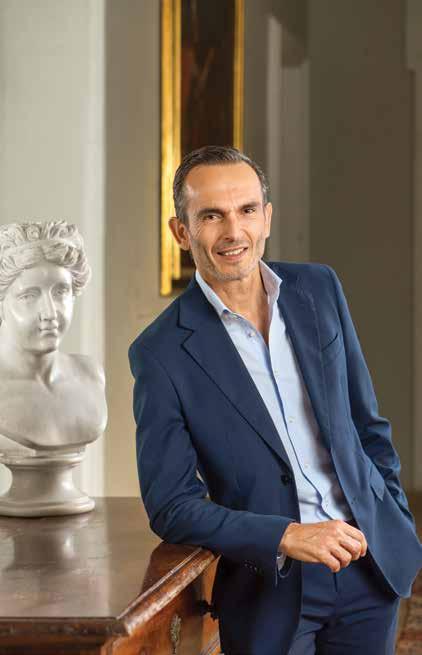
Currently, the Maltese economy, and businesses on the island, “are still having to deal with some remaining post-pandemic economic spillover,” he says. In the case of Simonds Farsons Cisk plc, the most challenging and disruptive issues over the last few months of 2022 “have undoubtedly been inflation, uncertainty in terms of supply, along with consequential supply chain issues, and the consequences of a tight labour market.”
Moreover, there are other factors to consider, when attempting to formulate a business forecast for 2023: “the potential spread of geopolitical conflict, the outcome of the energy crisis, which is not likely to be sorted in the short term, the consequences on the elevated levels of public debt and its repercussions on the economy, the rising cost of finance, continued uncertainty in supplies, a tight labour market, and more.”
Indeed, “this does not augur too well for 2023,” he says, adding that there are also cost of living concerns, “which some may feel are being mitigated through the wage growth being experienced. However, when considering the inflationary pressures, we could very well end up in a wage and price spiral which will disrupt consumer demand along with many businesses.
23 BusinessNow Cover Story
“Businesses
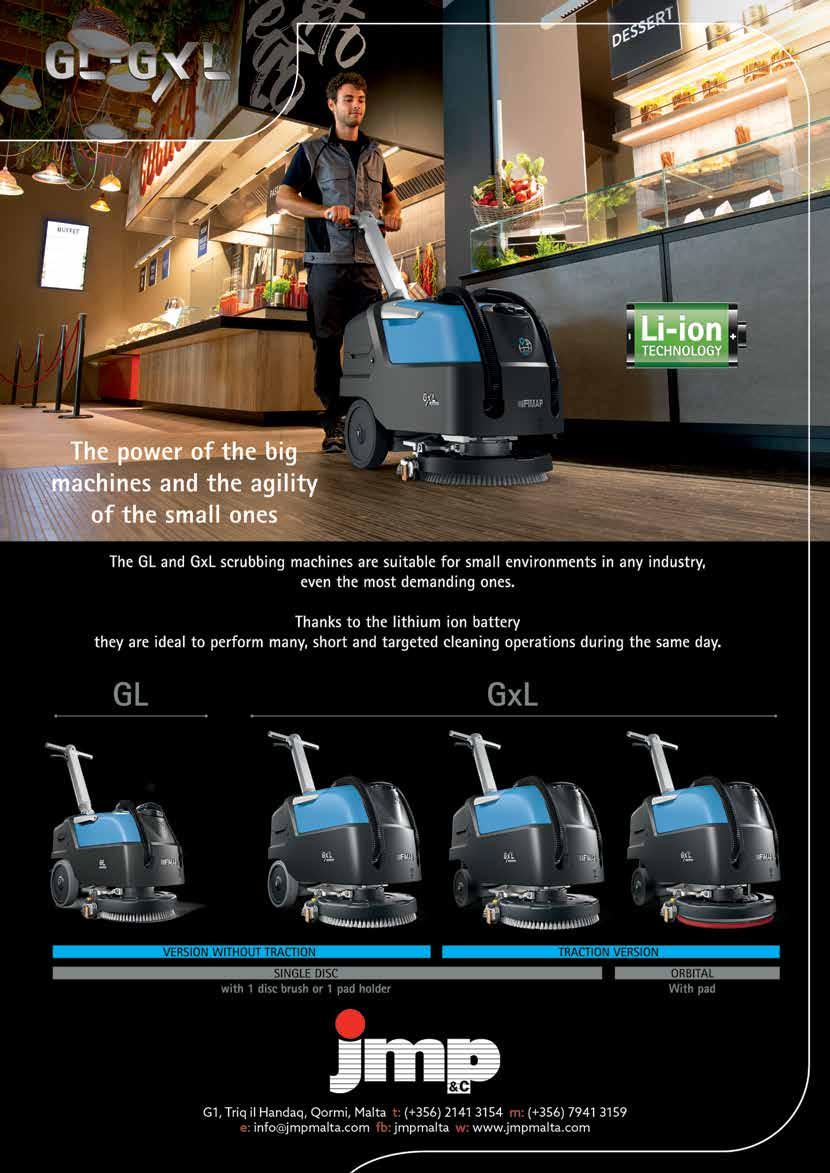
This, together with the tight labour market, may result in companies being forced to take on higher payroll costs than they can realistically afford with all the consequences on their financial sustainability and, hence, future prospects.”
Despite these challenges, there will be opportunities for businesses on the island, he says, which Simonds Farsons Cisk Plc will attempt to fully exploit. “Once the dust settles – and, indeed, after any period of turmoil – comes opportunity, and we are well geared to pursue such opportunities even if we, simultaneously, need to deal with some remaining challenges which 2023 will certainly offer.”
The company will, in this regard, “be moving ahead with several investments both within the environmental field and others, as we have done over the years. Likewise, we will continue to invest in those areas which, we feel, will give us a stronger market reach and presence in places where we still see growth opportunities. All this, with the aim of rendering our group business model more robust and competitive along with being better structured to meet the challenges and opportunities of today, but more so of tomorrow,” he asserts.
Looking at the wider manufacturing industry, Mr Aquilina explains that issues persist – “the manufacturing sector has been going through challenging times over these years, and, in many instances, struggling to be able to compete within a liberalised and highly competitive international scenario.”
Yet, as a result, opportunities for growth may emerge, but this requires initiative on behalf of the parties involved: “Given the local absence of raw material, those manufacturers that remain dependent on the local market are likely to struggle to progress, hence the need to internationalise. This, however, requires ongoing investment to ensure a highly efficient operation. So basically, those manufacturers that opt to stay on the back seat will continue to struggle, whereas those manufacturers that are in the driving seat will have the
opportunity to compete, innovate and ultimately progress going forward. It will not be an easy ride to succeed for manufacturers, but it is one that can be achieved, as long as the right strategy is firmly in place and related investments made,” he says.
Concluding, Mr Aquilina says that while 2023 may be a difficult year to predict – “given the extent of the moving parts” – a commitment to sustainability might help the Maltese economy weather the storm. “Over these years our economic gain has brought along a number of concerning social and environmental consequences. This has now brought into serious question our economic sustainability along with a growing debate on the need of a new economic model. It has become more and more evident that we need to move away from a construction-centric economic model. Achieving a sustainable and successful economic model needs to be built more on brains as opposed to cranes,” he says.
Thus, “starting from 2023, we need to embark on a determined drive in which our future economic prosperity, social well-being and environmental advancement are built on the investment in education and the further development of our skills and capabilities. This is the much-needed longer-term direction to take during 2023 and beyond, if we truly want to hold on to our competitive edge, along with a good quality of life.”
Steve Mercieca is the co-Founder and CEO of QuickLets, Zanzi Homes and QLC
Commercial Real Estate. Steve’s enthusiasm for new technologies and the way they may help disrupt the property market has helped the company grow rapidly over the years.
Despite Malta’s small size, its connections to the global market will allow the island, in 2023, to maintain a steady course, Steve Mercieca contends. “We are Maltese, but we are also European. We live in a connected world. Historically, Malta has always performed well in comparison to other countries in challenging times and I am confident that we will manage through the next 18 months, which are believed will be the most challenging, especially with the fluidity of the Russian invasion of Ukraine,” he says.
25 BusinessNow Cover Story
“If you really want to know the market and know your clients, feel the pulse of your people.”
“Achieving a sustainable and successful economic model needs to be built more on brains as opposed to cranes.”
This is a test of resilience, he continues, and “Malta has a strong track record on the matter. I believe the key is not to be complacent or underestimate the situation,” he says. Moreover, it’s imperative “to focus on what’s within our control and what isn’t. Understanding that a period of additional grit and determination is heading our way, as well as comprehending the need for making smarter choices, is one of those things within our control.”
In addition, Mr Mercieca asserts that, if various stakeholders from diverse parts of the Maltese economy come together, the island “has a chance to once again outshine larger countries in navigating through these tempestuous times.” This needs to be coupled with “a stronger stand on the environment, improved infrastructure, and further digitisation to reduce bureaucracy,” so that Malta will “attract stronger talent, which usually brings along higher salaries which are then consumed in the economy. This will also result in the Maltese upping the game on education as well as research and development, which will benefit current and future generations.” Indeed, improved employment opportunities for locals and expats create a multiplier effect, such as the need for better quality rentals, an increase in buy-to-let properties and improved design in construction.”
However, this vision must, necessarily, come with an awareness of the current context. Echoing other business leaders’ sentiments, Mr Mercieca points to the fallout from the COVID-19 pandemic and recent geopolitical conflicts as factors impacting the current economic and business landscape.
Indeed, in 2022, “following an initial shock to the real estate market during the pandemic, careful planning and fiscal incentives helped this market bounce back to the extent that it exceeded pre-COVID performance levels. This came as a breath of fresh air, considering that real estate agents did not make the cut in receiving individual support (wage supplement) from Government. However, we’ve always been an industry of hard workers and hustlers, so when
the incentives were presented to us, we worked harder to recuperate the lost ground,” he explains.
Unfortunately, as the world emerged from the crisis, the post-pandemic challenges which arose hit the bottom line. “We started to feel the pressures the pandemic left behind on an international level and soaring prices. If this wasn’t sufficient, the war in Ukraine brought along new issues. The cost of raw materials shot up and disposable incomes felt the crunch.”
These conditions impacted Mr Mercieca’s business portfolio, due to the effect on his staff, and on prospective business from abroad. “These resulted in a slower-thanaverage sales level in real estate, which in turn affected my team. Needless to say, the international climate and financial challenges left people mentally tired which required more physical effort to get things done. Thankfully, Malta’s extra boost of sunshine and sociable life helped with softening the blow.”
Looking to 2023, inflation and supply chain issues will present difficulties for real estate businesses on the island, which will be compounded by Malta’s “infamously slow average rate of completing construction work.” Elaborating on the difficulties to keep the market buoyant, Mr Mercieca says that “the average cost of raw materials in the construction industry rose by 20 to 30 per cent. If you also take into account the inflation rate of other goods, this left a lot of people out of pocket. And, despite Malta’s inflation rate being among the lowest in the EU, salaries did not catch up with these increases. This impacts people’s affordability and disposable income, which is the main determinant factor for banks to approve credit.” These factors will result in fewer prospective buyers being able to complete their property purchases, he explains.
Within this context, Mr Mercieca’s businesses will go back to basics, by ensuring that diversity, innovation and purposefulness drive the decisions of upper management.
26 BusinessNow Cover Story
“More than ever, observing the changing landscape and how people, including our clients, are responding to it is essential.”
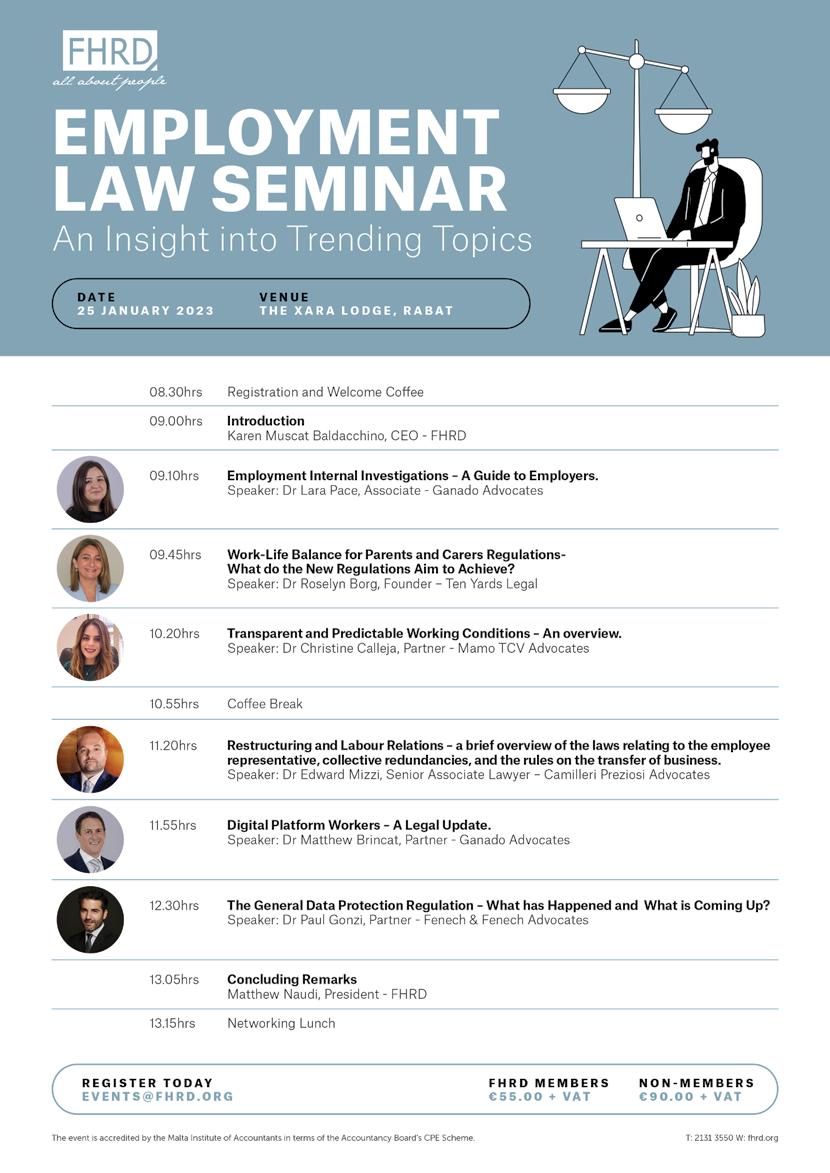

“More than ever, observing the changing landscape and how people, including our clients, are responding to it is essential. Continuously, the role that data plays in our decisions is increasing. This is accentuated by the fact that people need us to be more efficient, understand their needs faster and be available to fit into their busy lives, possibly more technologically than before.”
As a result, Mr Mercieca is a firm proponent of PropTech (property technology), that is, the application of information technology to the real estate industry. “The market is changing. We must understand it. Our clients and their needs are changing. We must understand it. Society is changing. We must understand it. Our relationship with our team is changing. We must understand it. Whilst cultivating what is within the box, we
must also make decisions which are innovative, diverse and purposeful.” By utilising the power of data and technology, Mr Mercieca hopes to achieve this.
In 2023, this will be coupled with a focus on the human capital which comprises his business. “I’m all for reports and research and analysis, but numbers don’t mean much if we are disconnected from the ones to contribute to those figures. No one is connected to the market and to our clients as much as our property specialists and administration team. Circular, versus vertical, decisions continue to be the best way forward. Listening more and doing more, based on what we heard, is surely a key to success. If you really want to know the market and know your clients, feel the pulse of your people. That’s what we plan to do,” he concludes.
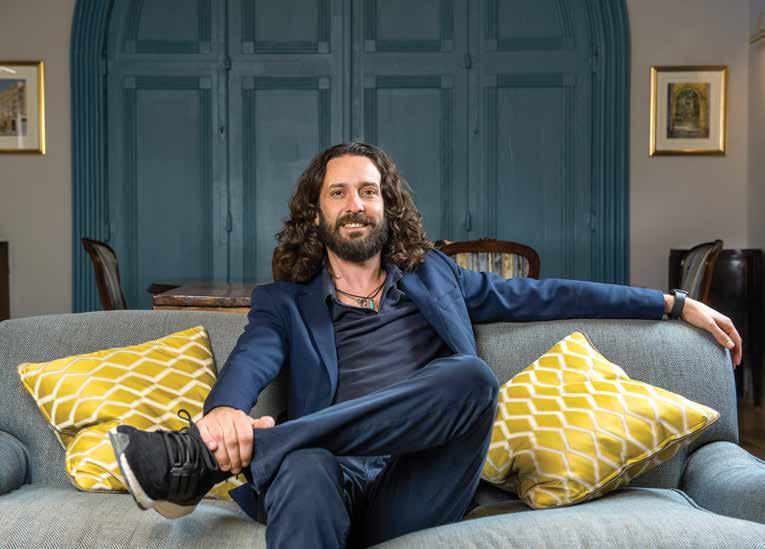
29 BusinessNow Cover Story
‘I always classify myself as a lucky person, though I have always worked hard throughout my life’
When one speaks of Malta’s key business figures and veterans, one would be remiss not to mention Joseph Zammit Tabona, whose remarkable contribution to local industry has been palpable throughout his long and decorated career on the islands and beyond. Here, he shares his inspiring story with Sarah Muscat Azzopardi.
TODAY, 16 MONTHS SHY OF HIS 80TH BIRTHDAY, the energy with which Joseph Zammit Tabona approaches the projects within which he continues to be heavily involved – and the drive to continue to be of service to his country – is palpable (and contagious).
As I sit opposite him in the beautifully furnished Presidential Suite at the Xara Palace (the culmination of a dream he shared with his wife Susan to restore the 17th century building to its former glory), it is with stunning clarity that he tells the story of his impressive career, spanning over 50 years in finance and industry.
His journey in local business finds its roots in 1968, upon his return to Malta as a young man, following a five-year Articleship in Accountancy with Turquand Youngs & Co in London.

“At the time, Leslie Duncan was the Malta General Manager, and he and Harold Farrugia were made Partners with effect from the 1st January 1970,” he says, recalling how he would soon join them as Partner himself, in March 1972, at the young age of 28. “I worked hard, as I have done throughout my life, and it’s probably because I enjoyed the accountancy profession so much,” he explains, humbly.

30 BusinessNow Interview
Joseph outside his family home at no 3 Victoria Avenue, where they lived till he was around 12 years old. The dog’s name is Fudge
He would go on to acquire the entire Malta practice together with the aforementioned Mr Farrugia some years later, in 1976, taking over the running of a company with an impressive staff complement of around 150 people. Then, after buying Mr Farrugia’s share in 1979, he began operating it under J. Zammit Tabona & Co.
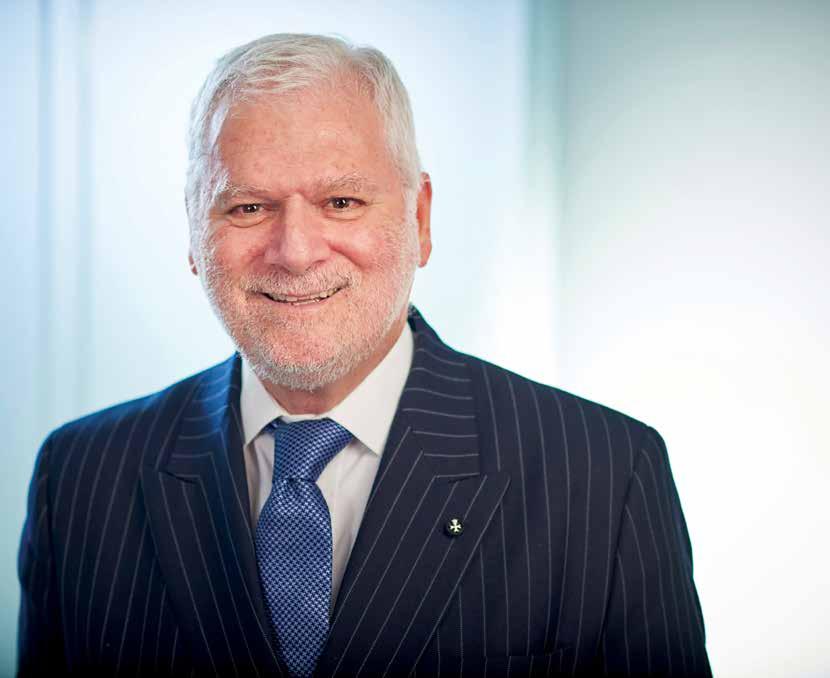
Some years later, after initially declining an offer to merge, Mr Zammit Tabona decided to join forces once more, this time with Norman Spiteri and John Bonello. “I remember we would meet in various hotel rooms towards the north part of the island so that people would not get wind of what we were planning to do,” he smiles naughtily. “The three of us were all educated at St Edward’s College so there was a common bond from the start. It was agreed that we would operate under Spiteri, Zammit Tabona & Co. and that we would continue to represent Coopers & Lybrand.”
Recalling a very particular obstacle the three faced at the time, Mr Zammit Tabona shares, “we were scheduled to make a formal announcement in June 1984, but we had to delay the announcement to August as I developed malaria during my travels, which restricted me to my bed for some six weeks!”
But this was not the last of the firm’s leadership changes. “In early 1988, John Bonello and I acquired Norman Spiteri’s share in the
practice, and started operating under Zammit Tabona Bonello & Co. A couple of years later we changed the name of the firm to Coopers & Lybrand,” he explains, which they kept until 10 years later, in 1998, when they decided to merge with Pricewaterhouse to form PricewaterhouseCoopers (PwC), which it continues to go by today.
Throughout this time, Mr Zammit Tabona began investing in property, he shares, starting with an apartment in Salina Court in 1981, before purchasing another, and another, in the same complex, and renting them out. “By the 1987 general elections I had acquired more than 50 per cent of the units within the complex,” he says, recalling how in 1988, he began working on developing the entire complex, giving it the name Salina Wharf. Later, in 2016, he would partner with Bilom’s Michael Bugeja to redevelop the entire footfall of 6,000 square metres of land that represented the former complex of Salina Wharf, and today, it is run by his son Justin, together with Mr Bugeja.
But when one thinks of Mr Zammit Tabona, it is probably another property that comes to mind: the Xara Palace Relais & Châteaux, within Malta’s silent city. Recalling how he acquired the 17th century palazzo from Robert Strickland in 1996, it took several years to restore and open its doors in December 1999. It was, and continues to be very much a family affair, he says: “restoring the Xara was my wife’s dream, and it was never on my cards to run it
31 BusinessNow Interview
“Throughout my life, I always set three-to-five-year targets of what I would like to achieve. I never disclosed my ambitions to anyone, so whether I reached those goals or not was my own decision.”
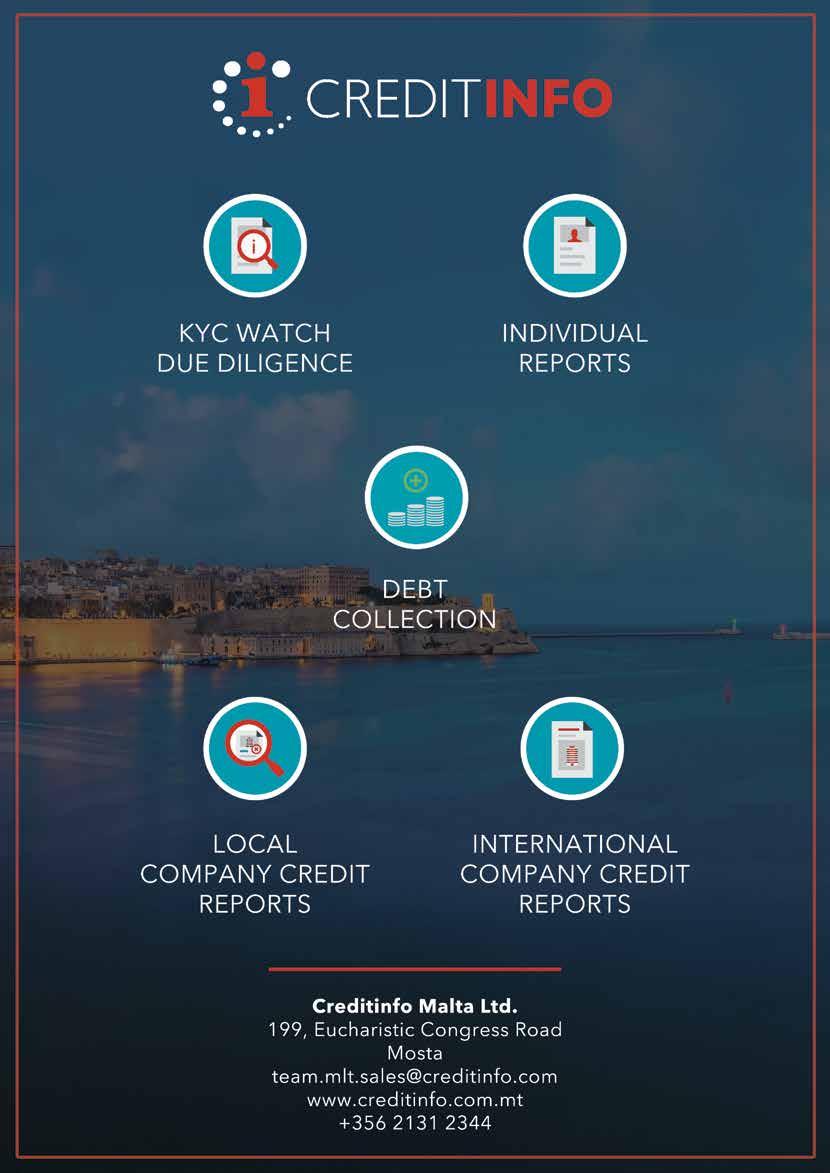
myself. My wife and children – my daughter Nicola Paris and son Justin – have been involved in the running of the hotel with various former General Managers and CEOs since then.”
Meanwhile, the end of Mr Zammit Tabona’s accountancy chapter came about in March 2000, when he decided to retire from the practice, but, as the well-known saying goes, when one door closes, another is sure to open, and in this case, it was several!
Over the years since retiring from the accounting field, Mr Zammit Tabona has served as Director or Chairman of several companies, and in each position, he maintains, “whatever my role would be, I would always aim for the very top. Throughout my life, I always set three-tofive-year targets of what I would like to achieve. I never disclosed my ambitions to anyone, so whether I reached those goals or not was my own decision.”
In tandem with his work at the firm, Mr Zammit Tabona had served as President of the Federation of Industry between 1991 and 1992, and in 2000 to 2003, he was appointed for a second term. Looking back, he recalls, “I decided to spend most of my time looking after the interests of manufacturing companies in Malta, which at the time represented a substantial sector of the local economy.”
This led to a gamut of roles within Malta’s Government. “Since March 2000, I have been extremely fortunate to have worked with Government in various honorary positions. As President of the FOI, I became a Board member of the Malta Development Corporation (MDC), The Malta Trade Export Company (METCO) and the Institute of Small Trade Practitioners (IPSE),” he says, explaining that at the time he focused on streamlining the processes with these Government institutions, and was ultimately appointed as Chair Designate to work on merging the three institutions by then Minister of Finance, John Dalli.
The result was Malta Enterprise, established in August 2003, for which Mr Zammit Tabona served as the first Chairman, until 2006. “The composition of the three Government agencies at the time totalled 211 people, and in the merged Malta Enterprise we only took 80 employees and engaged a further 12 persons from the private sector,”
Mr Zammit Tabona recalls, highlighting the important work undertaken in those early years to attract several pharmaceutical companies to set up in Malta.
Then, in 2006, Prime Minister Lawrence Gonzi asked him to become Chairman of the Malta Stock Exchange (MSE). “There had not been any IPOs or Corporate Bonds to market, and I changed all that by approaching former clients of mine to come to the market, be it for an IPO or, more strongly, for Corporate Bonds,” he explains, recalling several meetings with the College of Stockbrokers to explore how to strengthen Malta’s Stock Exchange.
2006 proved to be a busy year for Mr Zammit Tabona, and he was also approached by Minister Tonio Fenech to set up Public/Private enterprise FinanceMalta, which he did, in April 2007. He would then go on to serve as Chairman of the MSE and FinanceMalta until he was appointed Malta’s High Commissioner to the United Kingdom and Northern Ireland in 2009.
“Prior to that I was asked to become Malta’s Ambassador to the United States by three different Ministers of Foreign Affairs – one of them also offered China,” he reveals, smiling as he tells me how he turned them all down, for, “the United Kingdom was always my target, as it had been my second home since 1963!”

Sharing an anecdote from his time as High Commissioner – a role which he fondly describes as his “best experience” to date – Mr Zammit Tabona confides, “when I arrived in London, I was interviewed by the Diplomatic Magazine. In my interview, I said that I was going to concentrate all of my efforts on attracting business to Malta, which I did. Some two months later, I was given an appointment by the Marshall of the Court of St James to present my credentials to Her Majesty, the late Queen Elizabeth II. Needless to say, I was excited to meet the Queen for the first time, and when I did, the first thing she said to me was ‘I understand you are here to take away business from London.’ I went very red in the face and replied, ‘Ma’am, as you well know, Malta is a tiny place, and we could do with the crumbs of London, which would be more than enough for us.’ She laughed and that broke the ice,” he chuckles.
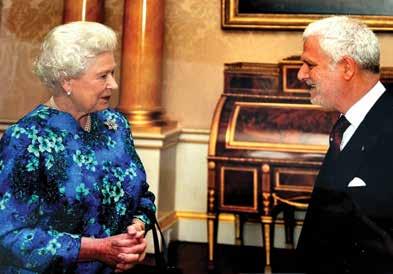
33 BusinessNow Interview
“I worked hard, as I have done throughout my life, and it’s probably because I enjoyed the accountancy profession so much.”
Joseph pictured after a Round Table dinner
With the late Queen Elizabeth II, when Joseph presented her with his Letter of Credence
Ever humble, the business veteran continues, “I always classify myself as a lucky person, though I have always worked hard throughout my life. I have always been extremely honest, and worked to the best of my abilities, though like everyone, I do have my weaknesses, which I am fully aware of.” Admitting to being camera shy and sometimes being lost for words – which I fail to pick up on throughout the course of our chat – Mr Zammit Tabona also concedes to having particular strengths, including an adeptness for networking, which have certainly come in handy throughout his business life.
Owing to his extensive experience in various sectors, I point out how he must have seen the island change, both in the business sense and in terms of landscape, to which he attests, “I can honestly say that I did see the face of Malta change from the late 1960s.” Commenting on the drastic increase in property prices since that time, when “flats in Qawra used to be sold for Lm300 and a garage for Lm100”, he feels that Malta has done extremely well with regard to the value of property, and is pleased to note that 80 per cent of local families own their own dwelling. What concerns him now, however, is the future.
“At present, I do worry that we do not seem to have a clear vision. I am a firm believer that anyone that wants to work can reach the top, but at the moment we lack the clarity of where we would like our beloved country and its people to reach. For instance, when I embarked on the Xara Palace, most businesspeople thought I was mad in trying to get a reasonable return from a 17th century palace with 17 suites. At the time, my wife and I wanted to have the best property on the island, and I feel that we achieved this, as within a year of opening our doors, we were asked to join the Relais & Châteaux brand. Since then, we have had many distinguished film stars and people staying at the Xara Palace, including King Charles III and the Queen Consort. We were also fortunate enough in having our Executive Chef Kevin Bonello who, through the de Mondion, was awarded a Michelin star on 26th February 2020.”
And despite his long and decorated career – having been conferred the knighthood of Magistral Grace by the Sovereign Hospitaller Order of St John in 1997, made a Member of the Order of Merit by the Government of Malta in 2016, and awarded a Lifetime Achievement Award by the Malta Stock Exchange in 2017 – Mr Zammit Tabona still has plenty he wants to do.
Apart from his role within the Malta Business Network –which he set up in 2011 – he is Chairman of Valletta Cruise Port plc and Tigne Mall plc, as well as Director of Klesch Group Ltd, for which he travels to London several times a month.
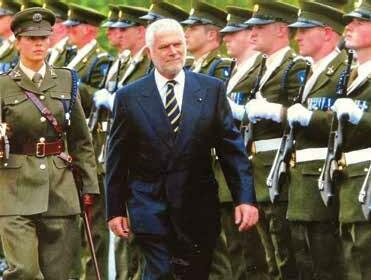
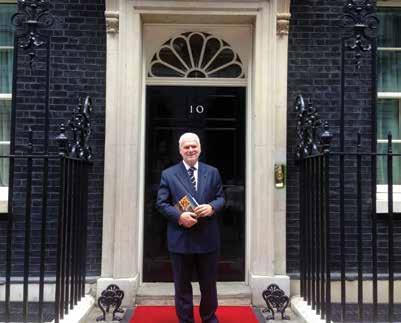
He is also not done helping his country, and is Chair of the Malta Financial Services Advisory Council (MFSAC), which is composed of heads of the Commissioner for Revenue, FIAU, MFSA, the MBR, the Malta Stock Exchange and FinanceMalta, as well as representatives from the private sector, namely the MIA, MIT, IFSP and the MBA. Sharing what’s currently keeping him busy, he reveals that the Council has recently finalised a detailed 10-year strategy for the financial service sector which was presented to Minister of Finance and Employment Clyde Caruana, who is now ready to head the implementation of this strategy document.
“I’m always keen to learn more, despite my age, and I continue to love connecting people. I have always enjoyed working, and the bigger the challenge the more I get involved,” he smiles, with a glint in his eye, as we conclude our chat – “life is a challenge, and it’s what you make of it.”
34 BusinessNow Interview
“I have always been extremely honest, and worked to the best of my abilities, though like everyone, I do have my weaknesses, which I am fully aware of.”
In Dublin, after Joseph presented his Letter of Credence to President McAleese and she asked him to inspect the Guard of Honour
Standing outside 10 Downing Street, London
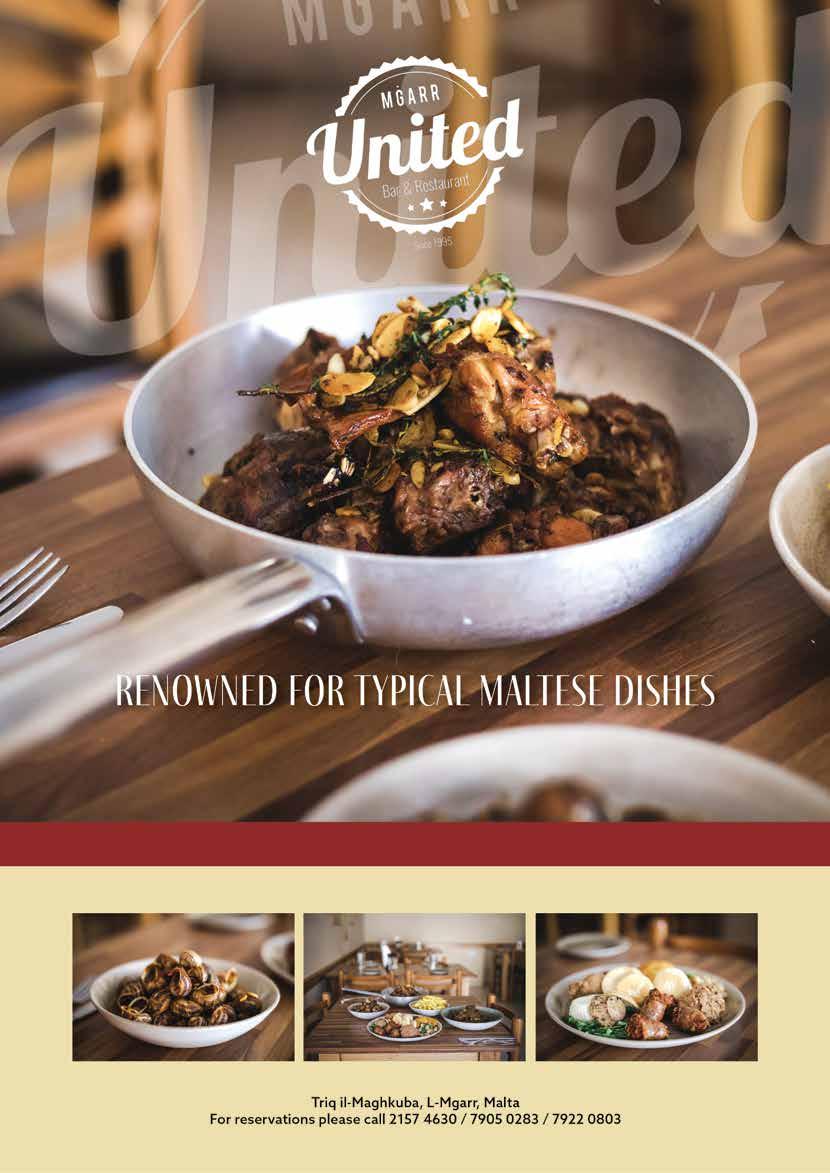
The power of compassion
Founded in 2020 as the COVID-19 pandemic restrictions started to bite, the Victory Kitchen has been helping thousands of families in need of basic food and amenities. Here, Founder and restaurateur Rafel Sammut speaks to Rebecca Anastasi on how empathy lies at the heart of his business and charitable endeavours.
AT ONLY 28 YEARS OLD, YOUNG RESTAURATEUR RAFEL SAMMUT HAD ALREADY CUT HIS TEETH RUNNING ONE OF MALTA’S BEST-LOVED EATERIES – the Pulled Meat Company – and was building a solid reputation with his new outlet, Briju, in Gzira, when the COVID-19 pandemic hit in early 2020.

“I was stuck at home, annoyed, with the kitchen closed and not knowing when the restrictions would end,” he tells me, as he sits in his restaurant, keeping an eye on preparations for the evening rush hour.
“It was at this time that I was approached and told of families in need, people who had lost their jobs because of the pandemic,

36 BusinessNow Interview
Borodyanka, Ukraine
and I thought: how can we help? We had chefs on the payroll, an empty kitchen, and we didn’t know how long the situation would last. We felt there was a cause, and we had all the resources in place – it made sense to use these,” Rafel recalls of the inception of the Victory Kitchen, which he runs together with Andrew Arrigo.
From the start, the demand was tremendous. “We went from serving 200 meals a week, at the very beginning of the pandemic, to 2,000 meals over the span of just two months,” he says. At its peak, and for the better part of the 15 months of the coronavirus crisis, the Victory Kitchen was serving 2,400 meals a week. This effort and compassion were given on a voluntary basis – “at the time, this was necessary, so the core team, including the chefs and our logistics partner, eCabs, provided the time and effort for free.”
Today, despite the waning of the immediate crisis, the Victory Kitchen still serves 1,400 meals a week across the Maltese islands. “We know this number may increase over the next year as inflation soars, and with a possible economic recession around the corner. In fact, we are anticipating a rise in these numbers,” he says. Onboarding beneficiaries involves a process of vetting: “often we get contacted either directly by the family, or by an institute, a social worker or another NGO; if it’s the latter, then they would have already reviewed the situation of the applicants to determine what the necessities are; but, when we’re approached by individuals, we have to cross-check the information to make sure the resources are getting to those most in need,” he outlines.
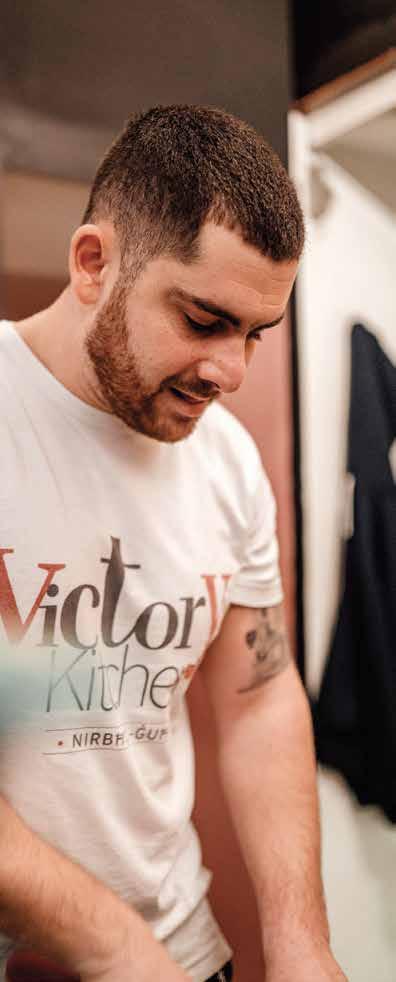
In cases where the level of need cannot be immediately ascertained, “our motto is to not let anyone go hungry”, Rafel says, so food is sent out, as soon as it can be, until more information can be collected. “Sometimes, we have families who also need basic medication, or need help paying their heating or electricity bills. They may even need essential detergents and cleaning products, for instance. During the pandemic, we also organised a system whereby we collected second hand laptops, serviced them, and provided them to families whose kids needed them to attend school lessons and to socialise,” he states, confirming that the Victory Kitchen caters to a gamut of diverse difficult situations.
“We may provide one meal a day or two. Sometimes, we only help people for specific spans of time. For example, pensioners often have just enough money to get through three weeks of the month but cannot make their funds stretch to the fourth. In these
37 BusinessNow Interview

cases, we step in to help. So, it all boils down to the individual case and, here, we’re helped immensely by the social workers and the NGOs we trust to give us a complete picture,” Rafel asserts.
Due to the complexity of the operation, it has more resources allocated to it than it did in 2020 – “there are three people working on it, full-time, with one person simply responsible for delivering food to households. But, because we now have more dependencies, Andrew and I have more commitment and responsibilities. And, if the funds and resources dry out, we have to see how we’re going to continue and move forward,” he says, explaining that the operation has a substantial yearly expenditure.
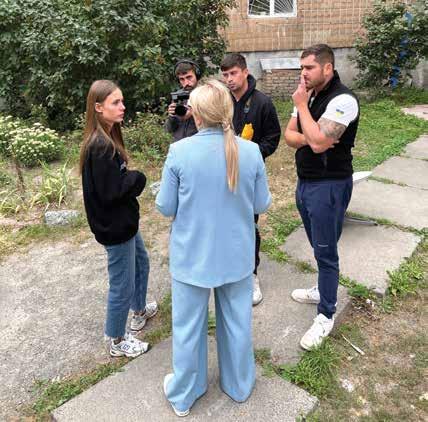
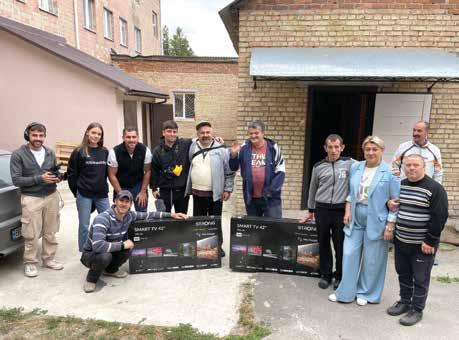
“Andrew and I still give our time voluntarily – and we’re in a position where, for now, we can. We each have our full-time jobs, but we make sure to dedicate a few hours a week to sorting out the logistics, planning the next steps and fundraising,” he says. The Victory Kitchen has, so far, received zero state funding, which has put pressure on both Rafel and Andrew to create initiatives to raise the necessary moneys required to keep the operation going.
“Sometimes it’s stressful, and I worry about getting into debt, since we also have our businesses to run, but we’ve managed to push through,” he smiles, explaining that they benefit from the generous donation of enterprises such as Happy Initiative – an international NGO which Rafel also forms part of – as well as the Alfred Mizzi Foundation, Izola Bank, Remax and Friends Foundation, as well as Deloitte Malta. “We’re lucky to have this support, but the small donations also make a real difference,” he asserts, pointing to the Christmas season as a good chance to show a spirit of generosity.
Fundraising events have also been organised, and these often put both Rafel and Andrew to the test. “We’ve done long swims to raise money for our initiatives,” he describes, swiftly adding “we’re not Olympic athletes or anything.” Despite his self-deprecation, the efforts invested in these activities are substantial. “Once a year we put ourselves through a challenge – this year, we swam 70km without stopping, and we managed to raise almost €120,000. Last year, we swam around Gozo, which took us 14 hours, and we managed to raise €60,000. Every year, there’s more momentum and the push has started to pay off,” he smiles.
More recently, the team organised a grand event in London. “We felt we needed to raise some money for the needy in Ukraine,” Rafel explains. The project involved taking 18 Maltese chefs to the UK capital to cook a Michelin-level dinner for 105 guests at the Corinthia Ballroom. “We sold tables and we had an auction, so there were a lot of logistics to organise,” he attests, saying that the event was a success, with much-needed funds raised. “We are always growing and learning, so hopefully, we’ll raise more money next time.”
This is testament to Rafel’s commitment to providing support within a wider scope than the Victory Kitchen encompasses. “The NGO Happy Initiative, for instance, tries to help anyone who needs it. We pump our efforts into helping charities overseas –we’ve helped a number of school orphanages in Africa, as well as homeless shelters in Germany. And lately, we’ve also been involved in helping the needy in Ukraine.” Indeed, Rafel describes his visit to the country a few weeks ago as transformative – “in just two days, I fell in love. Now, when I see something happening in
39 BusinessNow Interview
“We went from serving 200 meals a week, at the very beginning of the pandemic, to 2,000 meals over the span of just two months.”
Neuro/mental Institute, five kilometres outside Borodyanka Ukraine. The Head of the institute describes the hard situation they went through when Chechen soldiers took them captive for almost a month.
Neuro/mental Institute, five kilometres outside Borodyanka Ukraine. Here, together with friends from Help Ukrainian People (Ukrainian NGO) Rafel and his team presented the institute with a van of food, blankets and two televisions.
the news, I feel it’s happening here. Unfortunately, the war doesn’t seem to be coming to an end; rather, it feels as if it’s escalating.”
In the context of a fraught world, such commitment to social responsibility is, for Rafel, the underpinning to a ‘good’ life. “I’m a strong believer in karma, and I believe you receive the energy you put out in the world. However, showing compassion is more than that: it’s a powerful feeling which gives you as much satisfaction as you invest in it. If you get a parent calling for help because their child needs treatment – and you manage to acquire this for them – you’ve made a life-changing difference in their life; you cannot put this feeling into words,” he says.
Over and above the personal connections made, and the meaningfulness implicit in the act of giving, Rafel underscores the benefits businesses and entrepreneurs would see if they had to centre such social responsibility at the core of their activities. “I have, personally, learnt a lot from running the charity and this has spilt over into my businesses. I have learnt how to restructure the companies, in ways in which they are, now, easier to run and more profitable. Working within the NGOs has brought a lot of perspective.”
However, he believes that, unfortunately, the authorities overlook the work done by charities – “apart from the few chosen ones which are politicised”. Generally, he attests, “not many of the others are given the attention and support they need.” Indeed, he states that this situation persists even if the “work we do is essential, and if it had to stop, the impact it would have on social welfare would be massive, possibly devastating.” He admits to feeling a sense of discouragement when these efforts are not recognised – “when we ask the authorities for help, it’s because we really need it. When we don’t get it, we feel like packing it in, but when a mother sends you a thank you letter from their child, you know you cannot simply give up,” he says.
Indeed, looking ahead to 2023, Rafel concedes to being at a bit of a crossroads. “We have applied for a permit to convert an abandoned garage into our new kitchen, and there’s a high chance we’re not going to get it. In that eventuality, we have to rethink the entire year,” he says, explaining that, currently, they rely on the generosity of Vecchia Napoli at the Salini Hotel, which has lent out part of their premises to prepare the food for the needy. “We’ve worked with them for the better part of this year, but now it’s time to move. And, if we get the kitchen in place, we can hire another person and grow to meet the surging demand, spurred by the economic challenges we see happening around us,” he says.
In the meantime, as Rafel and Andrew wait for news, they continue the good work they set out to do more than two years ago. “We just focus on coming up with solutions, contacting the right people to meet the needs which are brought to our attention. Now, we have enlarged our network, so we know who to call, and we’ve become well-versed in being the middleman, so to speak. After all, it’s about the heart and effort you put in – that’s enough to make a difference.”
If you want to assist Victory Kitchen, in any way you can, email Rafel on rafsammut@gmail.com
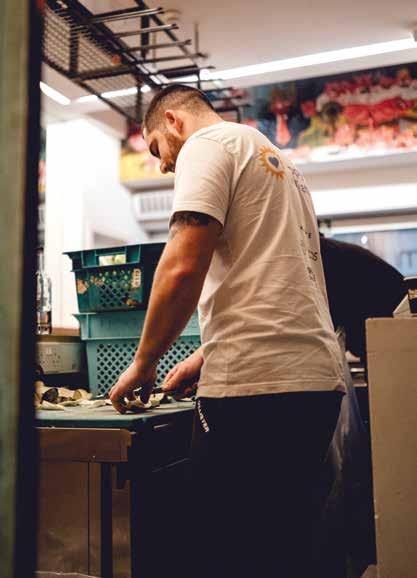
40 BusinessNow Interview
“If you get a parent calling for help because their child needs treatment – and you manage to acquire this for them – you’ve made a lifechanging difference in their life; you cannot put this feeling into words.”
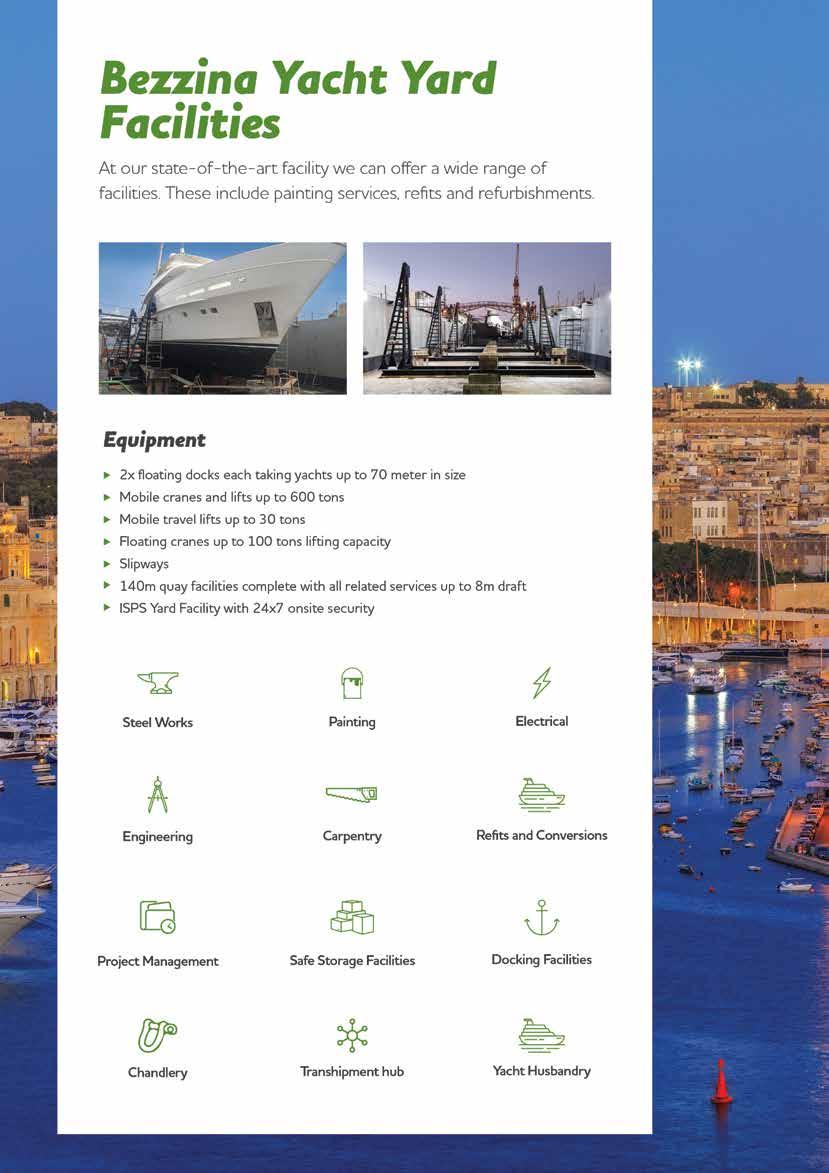
Spurring corporate adeptness in Malta — and beyond
Since its inception in 2020, Binderr has been driven to spearhead transparency and efficiency in corporate processes by streamlining simple procedures via its software platform and unifying business registries in Europe. Here, Founder and CEO, Jacob Appel, as well as Chief Operations Officer Zak Cassar Rose, speak to Rebecca Anastasi about their vision for the enterprise.
ACCORDING TO THE LATEST FIGURES PUBLISHED BY THE NATIONAL STATISTICS OFFICE, in 2021, there were 133,156 registered business units – an increase of 1.2 per cent over the previous year. Most of these (97.4 per cent) were considered ‘micro’ businesses, that is enterprises employing up to nine people, operating within industries as diverse as wholesale and retail trade (accounting for 14.3 per cent); financial and insurance activities (13.4 per cent); professional, scientific and technical activities (13.1 per cent); and administrative and support service activities (8.1 per cent).
With these myriad businesses being established, the corporate services sector has had its work cut out for
it in managing the dozens of submissions to the Malta Business Registry (MBR), including paperwork detailing director and shareholder changes, share price updates, as well as annual reports. Much of this work is done manually, with registries across Europe working in silos, making communication between entities time-consuming. Observing this first-hand, through contacts in the industry, Jacob Appel, the CEO and Founder of Binderr, is driven towards filling twin gaps in the market: firstly, the need to streamline business registry processes for Corporate Service Providers (CSPs) and, secondly, to connect entities across the continent to improve transparency and collaboration, particularly in relation to KYC and AML integrity checks.

42 BusinessNow Tech
PHOTOS BY ALAN CARVILLE
“We started Binderr, our online software platform, in 2020 to unify business registries across Europe and to create more corporate transparency, with easier access to company data, while streamlining the submission of corporate changes,” Mr Appel explains, going on to specify that the vision of the platform is twofold: “Binderr saves businesses that offer corporate services significant time – three minutes as opposed to 90 – because of our advanced automation, while giving regulators peace of mind that all businesses are compliant.”
Elaborating, he says Binderr removes “the need to spend hours on simple corporate changes such as a change in director. Usually, any corporate change requires you
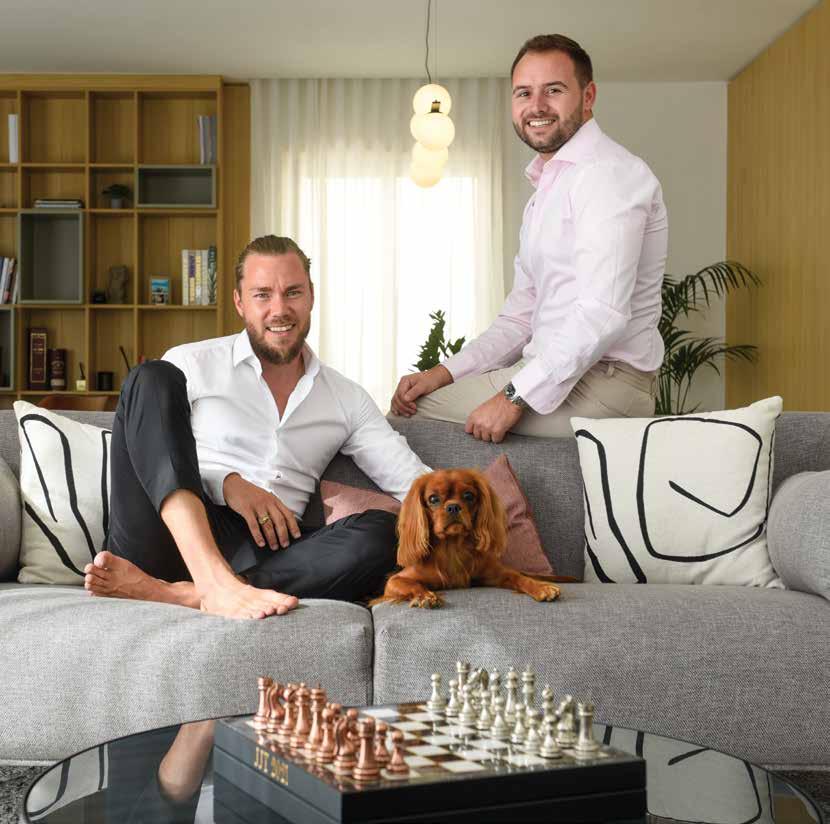
“Binderr saves businesses that offer corporate services significant time – three minutes as opposed to 90 –because of our advanced automation, while giving regulators peace of mind that all businesses are compliant.”
43 BusinessNow Tech
to draft, print, sign and scan multiple documents. This is not to mention the time and cost spent on courier services, as well as manually updating excel registers and submitting the documents to the authorities. However, on the Binderr platform, this is all done with a few simple clicks.” Indeed, it currently takes around 90 minutes to process a change in director, through the MBR and standard procedures – now, with the use of Binderr, it takes three minutes, Mr Cassar Rose elaborates.
The start-up is in a constant state of evolution, and the company’s milestones attest to the growth phase within which the enterprise finds itself in. Over the past two years, the company has managed to solidify an international team of “15 curious, fun and super talented individuals spread across four countries,” Mr Cassar Rose asserts. Through their work, the Binderr platform – “a fully-fledged corporate services platform that allows companies to manage their client portfolio and make corporate changes in seconds” – was launched, and the company was the first to be fully integrated with the MBR.

These successes are built on the company’s founding principles, Mr Cassar Rose continues, which are driven by understanding the necessity to increase paperless solutions within corporate and business registry functions, with all documents signed by Qualified Electronic Signatures (QES); the requirements to effect corporate changes “from anywhere in seconds” and, thus, to allow completing actions –such as making a share transfer – as simple as possible, or, as he describes, “as easy as wiring money”.
The enterprise’s achievements have not come without their difficulties, however. With regards to the platform, “we have faced several challenges in developing such intricate technology in a heavily regulated space. The task of automating these ‘legacy’ processes – which have been around for a long time – is one of them, since our aim to transform and digitise these out-of-date processes would have always come with a grain of resistance. Having said that, it has been amazing to see the support we have garnered along the way,” Mr Appel outlines.
Furthermore, collaboration with the MBR has required some manoeuvring. “Getting access from the authorities to connect to the registry and getting the approval from these authorities to accept the digital transformation movement (which includes implementing the QES system) has been demanding, but we have made progress in this regard.”
Integrating business registries in Europe is also part of this drive towards efficiency and transparency. Indeed, the
44 BusinessNow Tech
“We aim to expand into the European market fairly quickly.”
urgency to boost transparency in the sector underpins the transformations being offered by Binderr. “From being predominantly focused on building a platform for CSPs in Malta, we are now working on connecting all European business registries to create easier access to corporate data.”
The ultimate goal, Mr Cassar Rose continues, is “to unify business registries across the continent and to centralise access to corporate information – which comes from being present in all markets, working with all stakeholders, and understanding legal processes – which will allow us to, one day, become the leading corporate document management and submission platform.” This is due to the ability to cross-check entities and individuals, internationally.
Indeed, looking ahead, expanding beyond Malta’s shores is integral, Mr Appel says. “To have a material impact and to create true corporate transparency, we must expand across the EU,” he says. “Speaking with people in European institutions, as well as business registries and CSPs across the continent, has made us realise that digitising the functions outlined in corporate law is needed not only in Malta, but in the bloc too – and, thus, this is a
huge opportunity for us to lead that transformation.” With this in mind, while currently most of the company’s focus is on the Maltese market, and increasing local volumes, the company has “started working within the Cypriot market, to look at driving the same integrations with the local business registry and their Minister of Digital Innovation.”
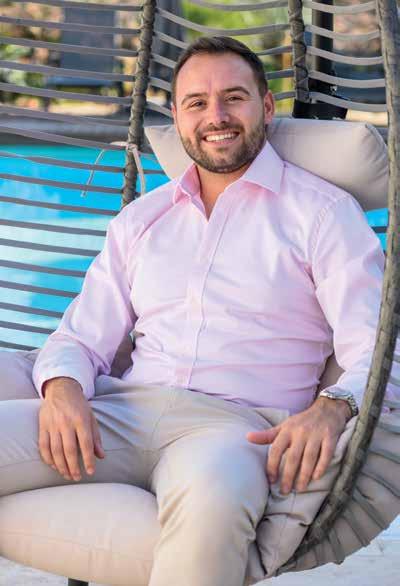

This, he continues is the first move towards expansion –among what he pitches would be many – for Binderr. “We aim to expand into the European market fairly quickly,” he explains. This will be possible due to the general applicability of their product – “the framework will remain the same”, he asserts, since diverse territories also struggle with the need to streamline business registry procedures.
Indeed, his goal is for Binderr to be present “within five different markets by the end of 2023. We aim to continue expanding our service area across the EU and, one day, the rest of the world,” Mr Appel asserts. And, with these efforts in “supporting and lobbying for advancements in the corporate and digital transformation space”, the company hopes to cement its position in the future of corporate technology.
45 BusinessNow Tech
‘The regulatory landscape for digital services in the EU is being fundamentally redefined’
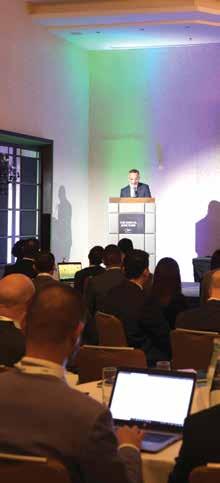
BusinessNow delves into the key topics discussed at the Malta Communication Authority’s recent conference The Digital Juncture, looking at how landmark legislation stands to reshape the digital world.
“PRESENTLY, THE REGULATORY LANDSCAPE FOR DIGITAL SERVICES IN THE EU is being fundamentally redefined, and a number of legislative initiatives are progressively being introduced,” explained Jesmond Bugeja, Chief Executive Officer at Malta Communications Authority, addressing the audience at a recent conference discussing emerging digital challenges organised by the entity.
The MCA – the national regulatory authority of the communications sector in Malta – brings to bear over two decades’ experience in the regulation of electronic communications services to the discussion, experience which has seen it take numerous regulatory updates in keeping with emerging trends and challenges in its stride.
Mr Bugeja, who also represents Malta in the Body of European Regulators for Electronic Communications (BEREC), went on to affirm, “for more than 20 years, the MCA has been regulating the communications markets, based on a set of rules defined at European level, sustaining competition which benefits consumers and businesses alike.”
“We find ourselves very much conversant in dealing with, and enforcing, the framework of communications regulation. However, as these frameworks continue to be modernised, so as to remain relevant to address emerging challenges in communication markets, it’s a completely different ball game when it comes to the new digital regulation.”
Over the past few years, the EU has been spearheading regulatory initiatives aimed at addressing these and other risks in the digital world. “The Authority has recently been entrusted to enforce various new digital rules adopted by the EU on non-traditional topics and sectors, such as trust services, web accessibility and cross-border portability of online content,” he stated, adding that the MCA has also been requested by Government to fulfil the role of Digital Services Coordinator under the newly adopted Digital Services Act.
Pondering on the complexities of digital regulation by looking back at the lessons learned from regulating more traditional sectors, Mr Bugeja referenced the role that social partners can play in supporting European and
46 BusinessNow Digital
national bodies for effective enforcement, as well as how best to ensure coordination and dialogue to achieve positive policy and regulatory outcomes. “We believe that a spirit of collaboration should pervade this process, and extend beyond public bodies. Industry stakeholders too, have a very important role to play in the successful implementation of the DSA, and potentially, other digital regulation initiatives,” the CEO added.
Following the CEO’s address, the conference featured contributions by local and visiting key figures in the digital sphere. These included speeches by Head of Regulatory Training at Cullen International Veronica Bocarova, who discussed end-user protection in electronic communications and the digital world; MISCO Founding Partner and Director Lawrence Zammit on the findings of a study on end users’ quality of service experience in electronic communications; Legal Officer at BEUC – The European Consumer Association Claudio Teixeira, reflecting on emerging challenges for consumers of electronic communications and digital services; Senior eSecurity and eSolutions Consultant Olivier Delos, who explored the opportunities of the eIDAS Regulation; as well as an overview of eCommerce, P2B and DSA regulations by MCA Digital Services Manager Bernard Agius and Senior eCommerce Analyst Denise Borda.
Hon. Silvio Schembri, Minister for the Economy, European Funds and Lands, also delivered a keynote speech, stating, “I cherish the initiative taken by the MCA to organise this event, which aims to discuss digital regulation and the application of good regulatory practices with multiple stakeholders participating in today’s digital economy.”
Describing the importance and impact of digitalisation, he went on to affirm, “digitalisation is fundamentally transforming the way we live and work together. It has consequences for the well-being and cohesion of society as a whole, as well as bearing deep impacts for businesses in all sectors, through effects on productivity, employment, skills, income distribution, commerce, and the environment.”
Panel discussions delving into eCommerce regulation also featured notable contributions by Joseph Farrugia, Director General of the Malta
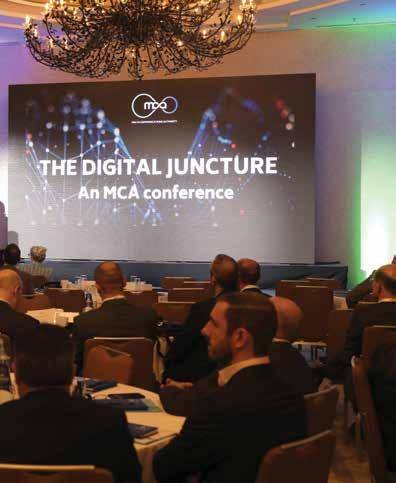
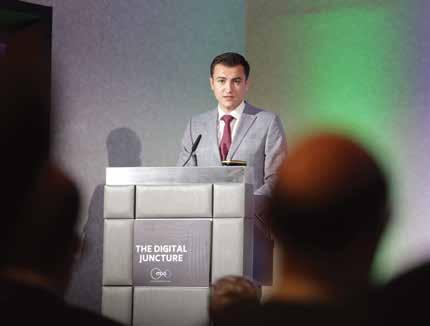
Employers Association; Marco Miozzi, Senior Legal Counsel within the Office of the Information and Data Protection Commissioner; Marcel Mizzi, Vice-President of The Malta Chamber of SMEs; and Odette Vella, Director of the Malta Competition and Consumer Affairs Authority.
A discussion on the myHealth Portal as a case study on web accessibility in the public service followed, featuring Janson Chetcuti, Senior Systems Analyst at the Ministry for Health’s Project Management Office and Robert Spiteri Staines, on behalf of the Malta Information and Technology Agency.
The final panel discussion dealt with a vision for 2030 in terms of regulating for sustainable growth, featuring contributions by Kenneth Brincat, Chief Executive at the Malta Digital Innovation Authority; Luciano Brincat, Fintech Supervision Deputy Head at the Malta Financial Services Authority; Olivier Delos, Senior eSecurity and eSolutions Consultant; and Marthese Portelli, Chief Executive Officer of the Malta Chamber of Commerce, Enterprise and Industry.
Rounding off the speakers at the conference, MEP Alex Agius Saliba, who was rapporteur of the Digital Services Act, also discussed the DSA and DMA, as well as platform-to-business regulation (P2B Regulation) – the first ever set of rules for creating a fair, transparent and predictable business environment for smaller businesses and traders on online platforms.
Describing them as the most far-reaching laws that have the power to reshape the digital world – encapsulating app stores, online advertising, eCommerce, and other everyday digital tools – he heralded a future in which digital regulatory policies should be a priority to the EU and Malta alike.
47 BusinessNow Digital
“Digitalisation is fundamentally transforming the way we live and work together.”
Hon. Silvio Schembri, Minister for the Economy, European Funds and Lands
A home for Malta’s heritage hops
Tasked with designing the bar atop Farsons in Mriehel, Openworkstudio understood the significance of creating an experiential location which will bear the test of time. Here, Alberto Miceli-Farrugia, the firm’s Partner, and Marta Lombardi, the Project Lead, talk to Rebecca Anastasi about the inception and the communal philosophy behind The Cisk Tap, the home of Malta’s much-loved brew.
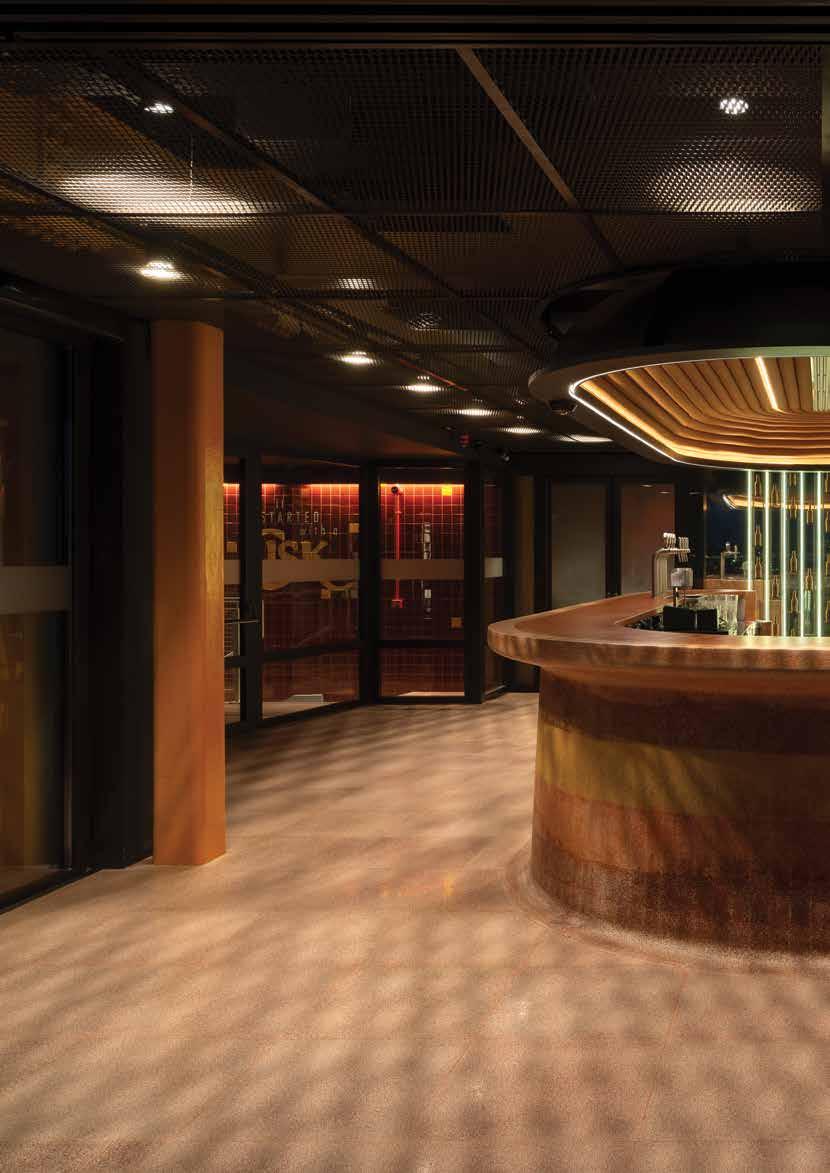
48 BusinessNow Malta’s Most Beautiful Businesses
PHOTO BY ALEX ATTARD
Malta’s Most Beautiful Businesses
THE €20 MILLION BREWHOUSE PROJECT SAW THE FORMER SIMONDS FARSONS CISK BREWERY, a stunning Grade Two listed art deco property, boasting a history spanning over 70 years, transformed, with 7,000 square metres of industrial space converted into offices, bars, cafes and restaurants, as well as retail. This facelift also incorporated a visitors’ tour of the old Brewhouse – telling the story of the brewery’s powerful legacy on the island – which leads directly to its bar on the top floor, The Cisk Tap, the site’s crowning glory, where guests can sip on an ice-cold Cisk at the end of a satisfying foray into the history of one of Malta’s most famous exports.
Designing the space, however, was no mean feat, as the team at Openworkstudio (OWS) – working in collaboration with another local studio, Forward Architects – attests. “We were asked to design a home for Cisk,” smiles Alberto Miceli-Farrugia, the Partner at OWS who
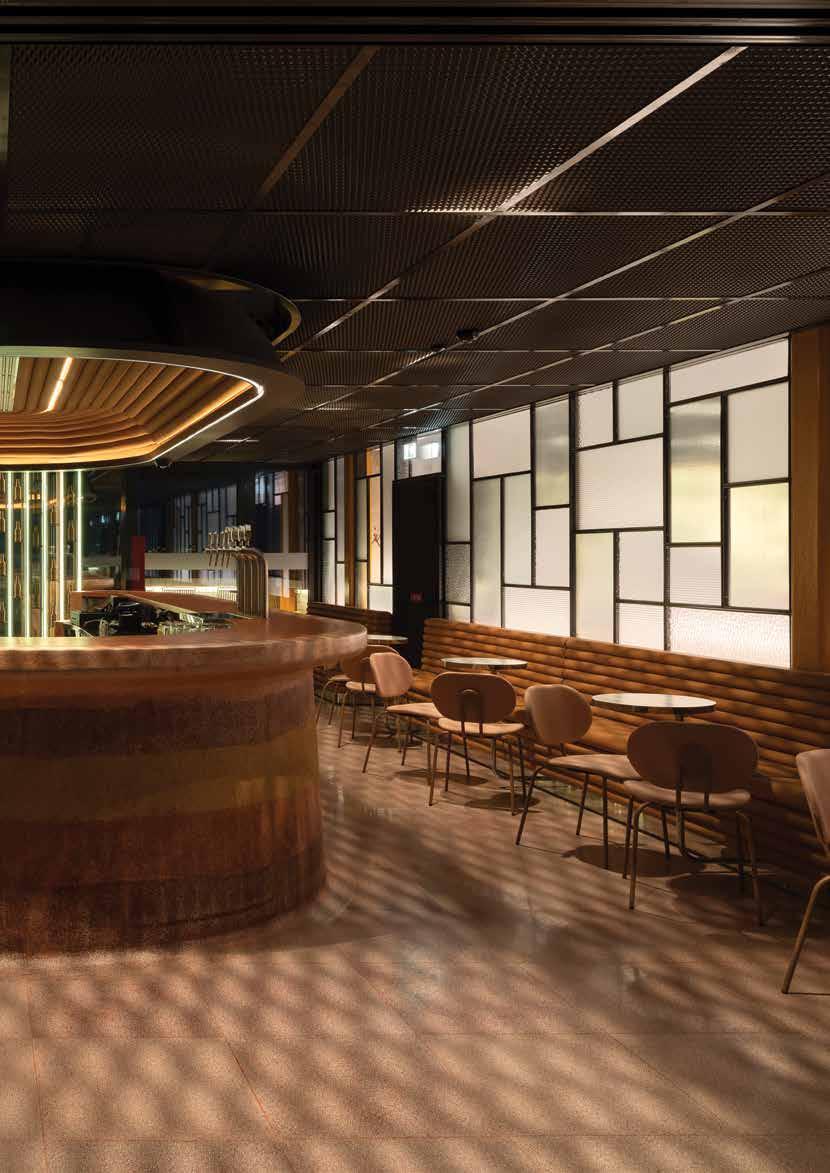
49 BusinessNow

was directly responsible for the project. “This bar, on the fifth floor, was developed to be the last stop for visitors taking in the Farsons story: after experiencing the museum downstairs, they are taken up to the roof where they can sample the freshest beer, in the heart of where it all began,” he explains, adding that the brief was also to ensure that this small space – consisting of 80 square metres inside, and 120 square metres of outside terrace space – could be converted into an evening venue, where people from around the island could go after work, or for an evening out.
“This was an added layer of difficulty. Moreover, as we started getting into the project, we were alerted to the floor downstairs, below the bar. Farsons had no particular use for the space, so they asked if we could look into integrating the two levels. We got back with a proposal to convert the space on level four into a multi-purpose hall, which would be flexible enough to cater for parties, talks, presentations, exhibitions, and dining events,” Alberto continues.
However, over and above the more pragmatic aspects of the brief, Farsons asked their design partners to transform the intangible –the history and heritage of Cisk – into something tangible – a home for the brew. “We always knew the space had to narrate many stories,” Marta Lombardi, the Project Lead, recalls. “These can only be told if you bring people together, so we wanted to create a sense of community, through the central counter, which is round, so that
everyone could gather around it,” she asserts, describing the most prominent piece in the bar.
“The counter is made of layered concrete, and it’s a solid mass, which points to the deep roots of the Cisk product – a brew which has a long legacy,” she states. Alberto continues, pointing to the “the earthiness of the counter, a connection to the terrain, which is mediated by the views outside. This is a very dynamic space and it’s deeply connected to the ritual of beer drinking. Therefore, the counter had to be relatively big, but it had to have enough space for people to be able to move around it. And, due to its size, everything
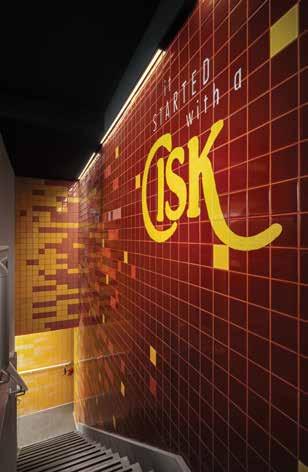


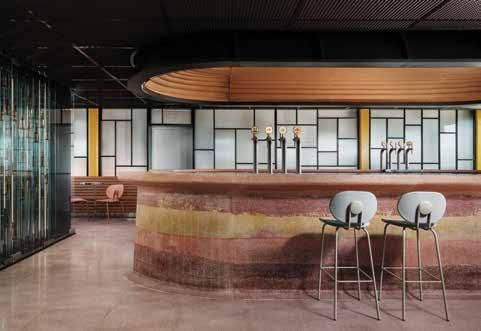
51 BusinessNow Malta’s Most Beautiful Businesses
PHOTOS BY RAMON PORTELLI
BY RAMON PORTELLI
else had to be carefully considered, so we had to assess the way the space flows to the north terrace – which has views over San Gwann and Valletta – or the south terrace, with views of Mdina in the distance.”
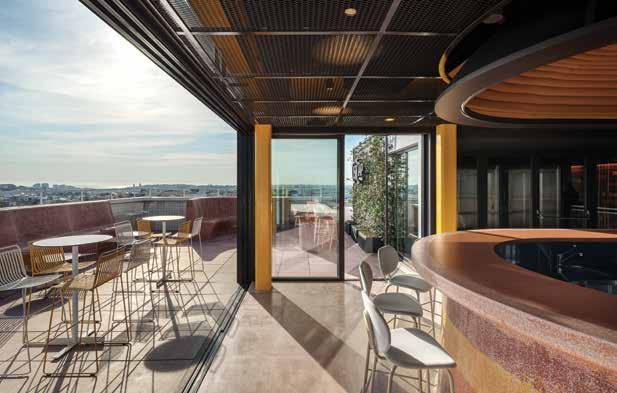
Indeed, the organic motif epitomised by the central counter is then repeated in the terrace, as Marta explains: “We thought of the design elements as a sequence of spaces, like little clouds or pockets, which were all linked. So, we have another concrete counter and concrete benches outside, where people can also sit around and talk.”
Furthermore, since the bar had to have “two different souls, for morning and evening,” as Marta eloquently puts it, the design itself had to cater to its myriad uses. As a result, the team decided to balance the solidity of the concrete materials with glass, adding “lighter elements. This is also a connection to the beer process itself,” Marta asserts. “You have these solid beads, and they’re being transformed into this golden liquid.”
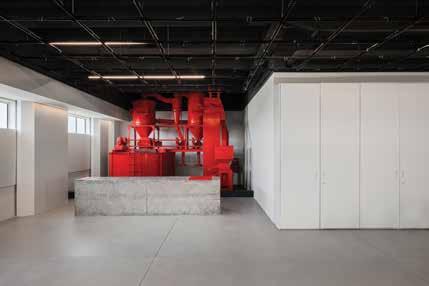

Alberto elaborates further: “We added a glass wall behind the counter, in homage to the Maltese village bar which, typically, features mirrors filled with advertisements. We wanted the space
Marta Lombardi, Project Lead
to feel like something connected to the community, but we didn’t want to be literal,” he explains. Moreover, the mirrors were placed in a position where they could reflect the landscape outside back into the bar, so that “the exterior and the interior look like one continuous space.” These elements were coupled with a bottle display behind the bar, marrying the earthiness of the design concept with the Cisk product itself.
The need for the bar to easily transition from day to night also meant the lighting had to be designed with this functionality in mind. “The space changes a lot as the day ends,” Marta describes. “And, we knew that, in the evening, the glass wall, and placing a light behind the concrete bar, would create a completely different atmosphere.” The team, indeed, opted for a simple lighting design, that is “well integrated” within the overall concept. Above the bar, a
52 BusinessNow Malta’s Most Beautiful Businesses
“We always knew the space had to narrate many stories.”
PHOTOS
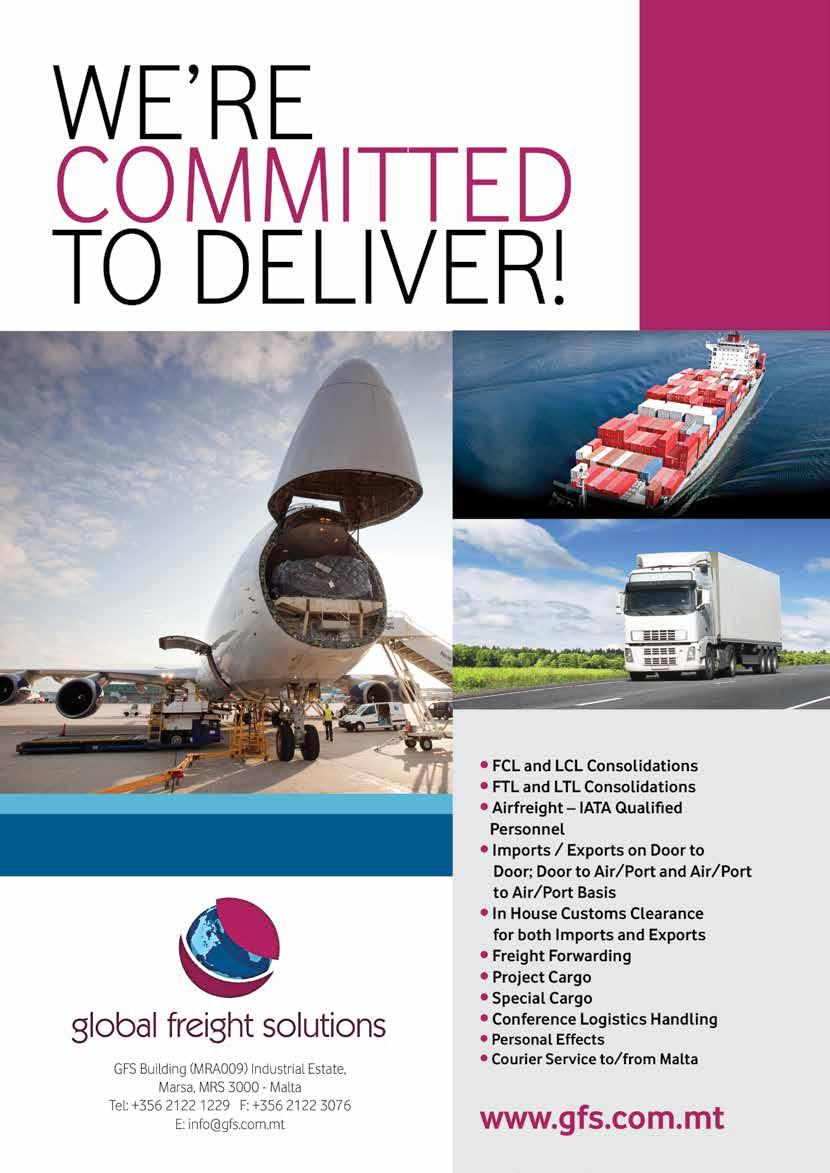
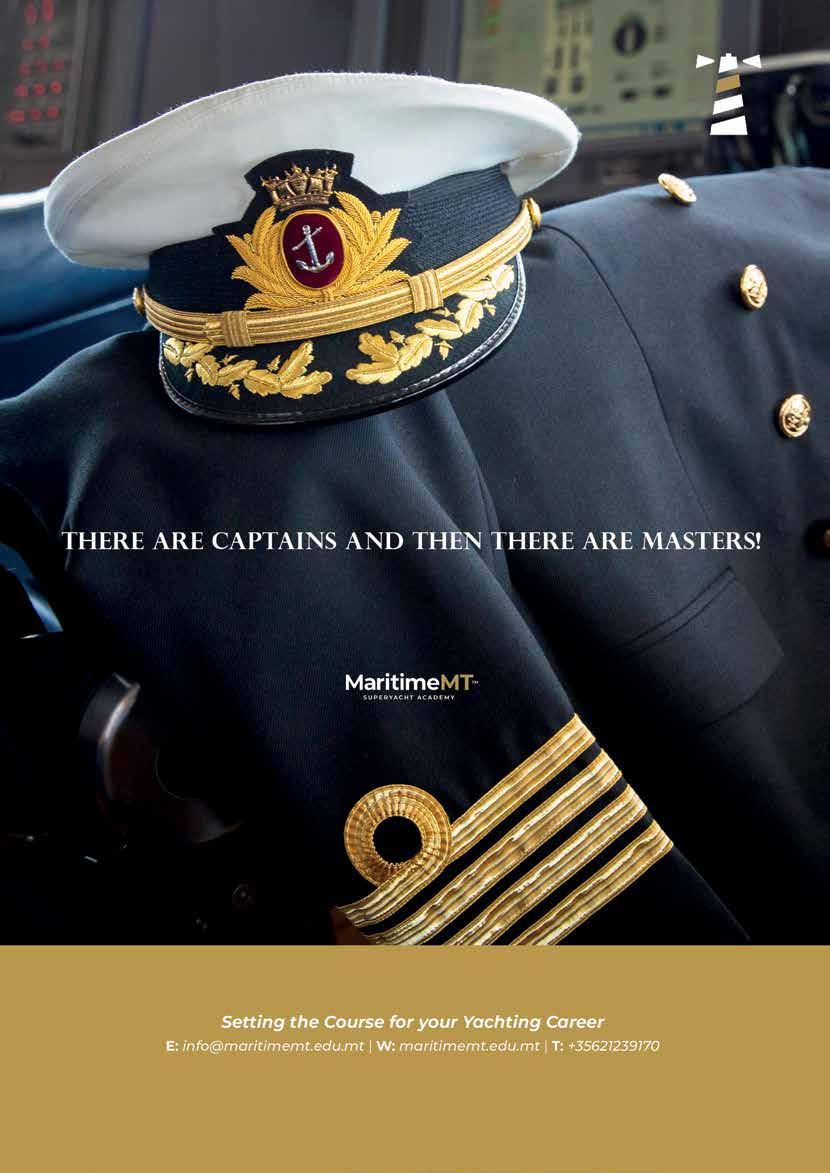
suspended mesh allows light to shine through, so at night, “a series of reflections highlight certain elements, for instance, the glass display, which also features LED lights reflecting through the bottles, and bouncing onto the glass wall behind,” Marta explains. There is also some subtle lighting on the terrace, so people are encouraged to congregate, she states.
Particularly impressive are the art deco LED logos –recalling the history of the brand – placed both on the terrace and on a tiled wall guiding visitors between levels four and five. This tiled wall bridges the two floors, creating continuity of tone, as the colours gradually seep into each other. “As you go down the stairs, the tonality of the tiles changes,” Alberto explains.
The project took a year and half to complete – from initial concept to handover – and a host of talent was responsible, from the large design team to the engineers, the bar consultants, the contractors, the project management staff from Farsons, and the lighting design experts. The team
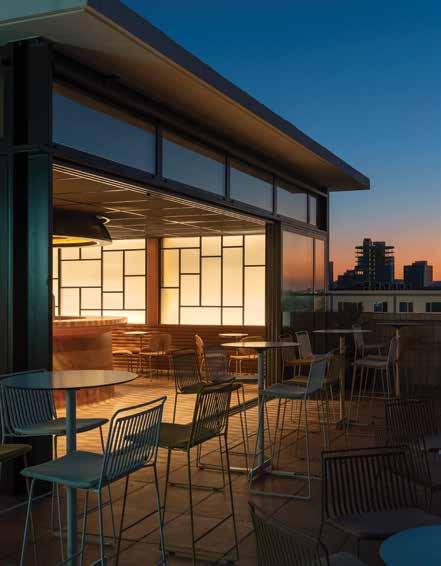
also employed manufacturers for the counter and concrete elements, the steel work, and the bottle display, as well as installers who put the pieces together. “A large number of people were involved, including Michael Pace, one of the Partners at Forward Architects, Zoe Mizzi, an architect also working at that studio, and Rebecca Delicata, from OWS,” Marta says, adding “this was only for the small space of the bar, which is quite incredible when you think of the entire scope of the Brewhouse project, and how many people were needed there.”
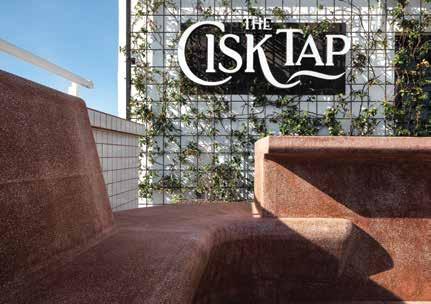
Ultimately, both Alberto and Marta stress that the significance of the project at The Cisk Tap lies in its prioritisation of design and construction quality. “Here in Malta, we need to foster a different way of creating new spaces and we should regenerate our architectural, industrial and cultural heritage – this is what Farsons, and everyone on the design and build team, were committed to doing,” Marta says.
Alberto agrees: “Farsons invests in its designs, and the company is renowned for the quality of its products, as well as the elegance of its offering. The company understands that investing in design is a necessity – it’s not an additional expense; good design adds value to your product. This is a lesson we also need to learn on a national level, I believe,” he says.
Indeed, he continues, “at the moment, our experience of our cities and towns is suffering due to the poor quality of the spaces we create and inhabit. We’re made to bear these. But our mental health would be much more balanced if only we paid the landscapes around us more thought.” For, he insists, it’s the fostering of a sense of community and togetherness through the architecture around us which will benefit us in the long run – “we need to create places for kids to play, and for us to experience chance encounters; this is what it’s all about,” Alberto concludes.
55 BusinessNow
Most Beautiful Businesses
Malta’s
“We added a glass wall behind the counter, in homage to the Maltese village bar which, typically, features mirrors filled with advertisements.”
Alberto Miceli-Farrugia, Open Work Studio Partner
PHOTO BY ALEX ATTARD
PHOTO BY RAMON PORTELLI
20 years of FXDD: ‘Increased volatility represents increased opportunities’
This year marks a special milestone for Triton Capital Markets Ltd, operators of the FXDD brand: the 20th anniversary of FXDD – two decades since the broker’s first step into the trading industry in 2002; and 10 years since they entered the European Economic Area as an investment company licence holder. Lachezar Ivanov, Head of Risk at FXDD, talks to Sarah Muscat Azzopardi about the company’s plans moving forward, as well as what current market conditions mean for business and the economy.
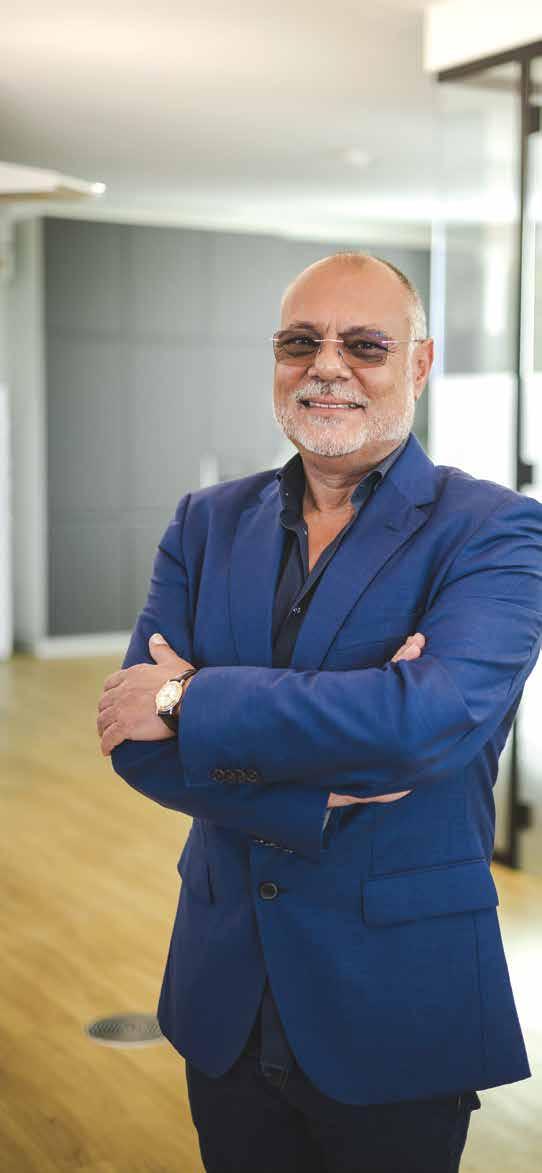
56 BusinessNow Investment
CHARTING
TRITON CAPITAL MARKETS LTD (TCM) AND FXDD’S

and development over the years, FXDD’s Head of Risk Lachezar Ivanov reflects, “we have seen many brokers come and go over the years. We have been here since the industry’s infancy, continuously working to build and maintain a great trading environment and provide superior service for our clients.”
GROWTH
Indeed, the last 20 years have seen the brand build up a wealth of knowledge, together with a highly experienced team. “We have also invested in high-end technologies to be able to bring to our clients products which are intuitive, easy to understand and user friendly,” says Lachezar.
Throughout his own time at TCM, the Head of Risk outlines several achievements, which he attributes to the combined efforts of all departments within the Group. “In the last seven years, together with the trading desk, finance, client support and compliance departments, the group has increased client equity and volumes, extending our presence to new geographic regions, including Asia, Africa and the Middle East. The Group’s latest achievement came about during last October’s Forex Expo, when FXDD was awarded the distinction of best FX provider in The Middle East.”
Tracing his own journey, Lachezar comes with more than 20 years of experience as Head of Treasury and Financial Risk Manager with different banking institutions and investment companies. Joining TCM as Head of Risk in 2015, he recalls a number of volatile years in the industry leading up to this point, but somewhat surprisingly admits, given his position, this is not necessarily a bad thing.
“As financial risk manager of an investment company, I like market volatility, as it is helpful for sustaining diversity in the risk models applied in our daily work. What I particularly enjoy at TCM are the never-ending dynamics and the constant necessity of alignment of strategies entered the previous day. This requires absorbing a lot of information and its subsequent evaluation,” he explains, noting that a successful risk management process is based on a combination
57 BusinessNow Investment
“The Group’s latest achievement came about during last October’s Forex Expo, when FXDD was awarded the distinction of best FX provider in The Middle East.”
PHOTOS BY INIGO TAYLOR
of evaluation of economic indicators, called fundamentals, technical analysis and, last but not least, an assessment of the group behaviour in the respective market.
“In addition, the process has to be simplified. To achieve this goal, we operate an in-house developed quantitative risk management system, with predefined thresholds, in line with the regulatory requirements,” he says.
Recent years have brought about their fair share of volatility, and 2022 has certainly continued to deliver on this front, with the pandemic and the war in Ukraine generating increases in global energy prices, high inflation and supply chain shortages. Reflecting on the impact of these realities moving forward, Lachezar gravely forecasts “economic slowdown with all the
negative consequences, like increase of unemployment and probably negative growth of GDP.”
However, he is quick to reiterate that increased volatility represents increased opportunities too. Highlighting the different factors involved in order to gain some understanding on possible future market developments – and to react accordingly when opportunities present themselves – the Head of Risk maintains that, pointing at the pandemic and the war in Ukraine as the only factors for the current recession across Europe is equal to simplifying the cause, which has complex roots in the last decade, in the monetary and fiscal policies, and the energy sector.
“Let’s consider the global energy prices. For instance, one of the countries with the biggest industrial output in the EU is Germany. During the last years, the electricity production from nuclear power stations and fossil fuels was being reduced, reaching a dependency on renewables of almost 60 per cent, mostly via wind and solar. However, because of the weather conditions last autumn, Europe as a whole experienced a shortage of electricity, while missing the opportunity to increase gas storage capacity during the summer of 2021, which has been depleted during the winter period in the beginning of 2021,” he asserts.
“To cover peaks in electricity demand, fossil fuels were the only option, and the resulting greater demand for fossil fuels prompted price increases in all energies,” he continues, affirming that while consumers were burdened by these spikes in prices, for markets participants they were an expectation.
Moving on to the high inflation, Lachezar notes that, while we tend to explain it with increased energy prices, this is only the ripple effect of one component over the basket of the Consumer Price Index and Producer Price Index. “Again, evaluation should be rather based on multiple complex policies implemented in the past,” he affirms, highlighting the fact that the increase of the money supply by the Central Bank and Government spending during the pandemic in the Eurozone is another component to consider.
“The supply chain disruptions are an additional factor that significantly deteriorates the situation as they are unpredictable, and ripple through different markets and
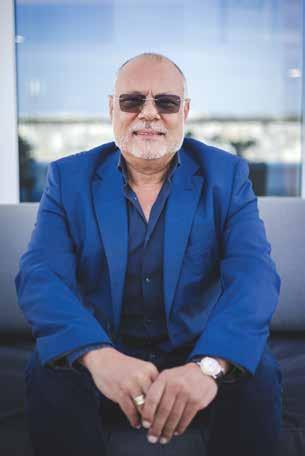
58 BusinessNow Investment
“As financial risk manager of an investment company, I like market volatility, as it is helpful for sustaining diversity in the risk models applied in our daily work.”
industries. For instance, a wind down of farmers’ output in the Netherlands will affect the revenue of KLM, which would damage the cashflow of Air Malta, being an entity in the group,” Lachezar continues.
Last but not least, the Head of Risk considers the effect of the war in Ukraine as severe, especially for Europe. “There is a financial necessity to solve the conflict as soon as possible,” he asserts, maintaining that while sanctions are expected to bear fruit in the long term, history shows that diplomacy is a tool which brings more immediate results. By way of example, he notes, “Iran has been under economic sanctions from the US since 1979, while Obama’s administration achieved diplomatic solution between five+ countries during the second term.”
Concluding his analysis by admitting that it’s difficult to put a silver lining on the current economic situation, Lachezar draws on the work of economist Arthur Okun, who, back in the 1960s, created the misery index, using the simple sum of the nation’s annual inflation and unemployment rates. “Years later, one of my favourite economics professors, Steve Hanke, added to the index the average cost of mortgage and subtracted the real GDP,” he notes, bringing it all to bear on the current economic situation.
“In general, it is considered healthy if numbers are six per cent and below, while numbers above 15 per cent are critical. The current inflation in the EU is 10.9 per cent and that’s only the first number. The unemployment rate is six per cent, the average cost of mortgage is two per cent and the estimate of real GDP -0.4, so currently we end up with an index of 19.3 per cent. The silver lining is that by knowing the number, we have a base to create expectations for future market developments.”
Turning his attention to local businesses and the local financial markets, which have so far shown resilience, I ask Lachezar if he thinks Malta can continue to sustain this reality. Noting that Malta’s inflation rate currently stands at 7.4 per cent, below the EU inflation of 10.9 per cent and the Eurozone inflation of 9.9 per cent, the Head of Risk affirms that the ripple effect of the EU inflation is reduced. Pointing out some of the reasons behind this, he mentions the LNG prices Malta was able to secure back in 2017, as well as the reaction of the Maltese Government towards containing the ripple effect, including with subsidies.
Another reason is the structure of the GDP per sector on the island, Lachezar continues, and the fact that the service sector is the main contributor, with over 70 per cent. “Within this percentage,” he points out, “the gaming industry, together with investment companies, account for around 10 per cent of Malta’s GDP, and these sectors perform better in volatile market conditions. We have to also consider the employees in the gaming and financial sector – probably around 10 per cent of the labour force in the country –as well as the professionals, who provide supporting services for the industry. The Gross Value Added per employee is among the highest across all sectors in Malta’s GDP.”
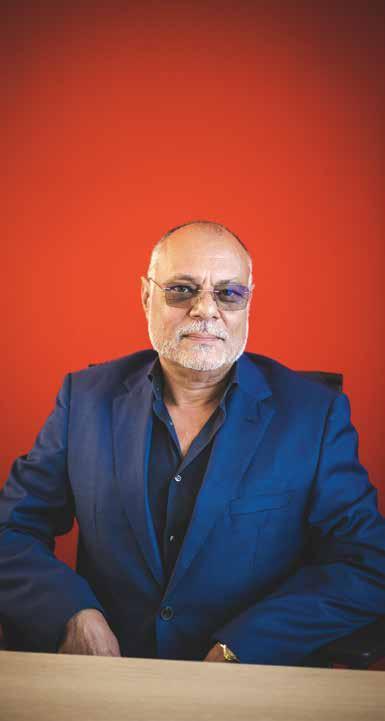
Finally, he concludes, while Malta is a member of the Eurozone and it experiences the negative effect of the downtrend in the EU, the outcome is hampered partially by local corporate law and legislation.
Bringing all of this to bear on TCM and FXDD moving forward, Lachezar looks toward further growth in 2023 and beyond. “We are starting new projects by the end of this year, one aiming to increase client equity from clients in the Eurozone, and the second in the form of an additional licence in the financial area, which will provide us with capabilities to improve the services provided to our business clients,” he says, also highlighting the company’s recent move to new premises within Trident Park in the Central Business District in Mriehel. The new, larger offices, he concludes, give the company the possibility of increasing employees, in line with its growth strategy.
59 BusinessNow Investment
Housing new industries in the face of limited spatial availability
WHAT IS THE NEW CHALLENGE BEING FACED BY MALTESE INDUSTRY?
It is not a lack of investors wanting to make our island their base of operations. It is certainly not a lack of local companies willing to diversify and expand their existing operations. It is square meterage.
You will excuse the pun but, as far as Malta is concerned, this goes with the territory. Whichever way you look at it, whatever you do, there is no escaping the fact that we shall always remain a tiny land mass surrounded by a lot of water.
Rightly enough, INDIS has striven to operate within the national spatial framework provided
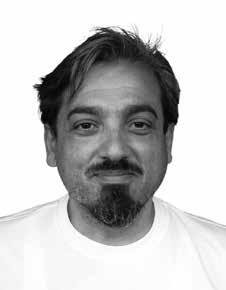
by the 2015 strategic plan. We have held back from taking up land in rural areas for industrial purposes as much as possible, and then, only as a last resort after having exhausted all alternatives. To this end, INDIS is currently undertaking a rationalisation exercise in conjunction with the Lands Authority, aimed at identifying all state-owned land and buildings lying within, or contiguous with, industrial zones that have not yet been transferred to our property portfolio.
Another solution would be going vertical. Yes, factories can in fact go vertical, although this presents its own challenges. INDIS has been working on expanding its industrial estates in a vertical manner for quite some time, starting

60 BusinessNow Industry
Chief Technical Officer Noel Azzopardi reveals how INDIS Malta is increasing industrial spaces while limiting the take up of new land.
Going vertical enables enhanced utilisation of the available land mass through the accommodation of compatible industries within the same area currently occupied by just one factory. This is greatly aided by the fact that machinery and equipment tend to get smaller and somewhat lighter as technology advances, making going vertical even more practical and effective. Just to put things in context, consider a factory that would currently have a footprint of 3,500 square metres, out of which 2,000 square metres would constitute the built-up area. Once demolished and rebuilt, this would translate into a total built-up area of 14,000 square metres while still retaining an unbuilt area of 1,500 square metres around the building.
This would make it possible for INDIS Malta to futureproof the available land portfolio, providing an additional 200,000 square metres of space over 10 years within the same boundaries. Achieving this aim requires substantial investment, set to start as early as January 2023, through a planned investment programme valued at €400 million spearheaded by the Ministry for the Economy, EU Funds and Lands.

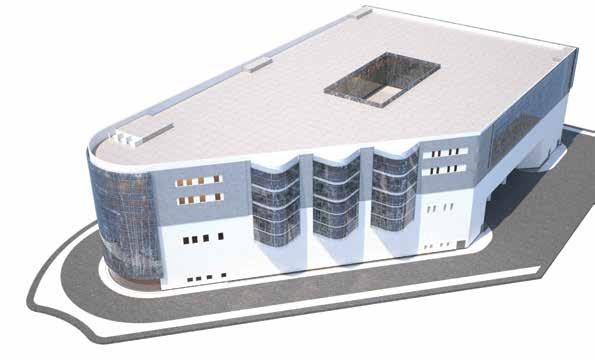
with a revision of the planning process. The necessary legal framework has already been put in place, allowing for factories in clearly defined industrial areas to go higher than 15 metres in a controlled manner, depending on the specific location within each estate in relation to the surrounding area.
INDIS being the main driver behind industrial expansion, we seek to be at the forefront of initiatives aimed at maintaining environmental and societal well-being. Careful implementation of the new legal provisions will greatly soften the impact of increased industrial development, and the resulting activity, on surrounding areas. Indeed, industrial spaces located next to residential areas shall maintain their current height, with plans underway for the creation of green buffer zones as soon as these industrial spaces are released.
61 BusinessNow Industry
Digitisation drives the future at Muscats Motors

Established in 1936, Muscats Motors, the local concessionary for behemoth brands such as Jaguar, Land Rover, BMW and MINI, have become synonymous with heritage and old-school quality in the automotive sector. Yet, as the firm’s Marketing Executive, Gianluca Busuttil, tells Rebecca Anastasi, the car distributor has set its sights on technological innovation to spearhead sustainable growth.
MALTA’S LOVE AFFAIR WITH MOTOR VEHICLES
IS HARD TO DENY. Indeed, according to figures published by the National Statistics Office, the number of licensed cars on the road reached 422,476 – almost one for every person living on the island – as of September 2022. Of these, 74.9 per cent are passenger cars. Yet, as the world moves into more tenable ways of living, in the context of rising costs and climate change, the role of the automotive sector is being recalibrated – and that, according to Gianluca Busuttil, Marketing Executive at Muscats Motors, also requires new ways of communicating with clients to ensure their needs are met, in a changeable world.
Central to this philosophy, Mr Busuttil asserts, is a move towards further digitisation of the operational chain. “We’ve been making big leaps to ensure that we are ahead of the
62 BusinessNow Motoring
curve with our latest innovations in the automotive industry. This year, we launched our new website which makes it easier for customers to find their desired vehicle. Our website is responsive and mobile-friendly; it automatically detects the device that the customer is using, displaying it appropriately, for the best viewing experience,” he says.
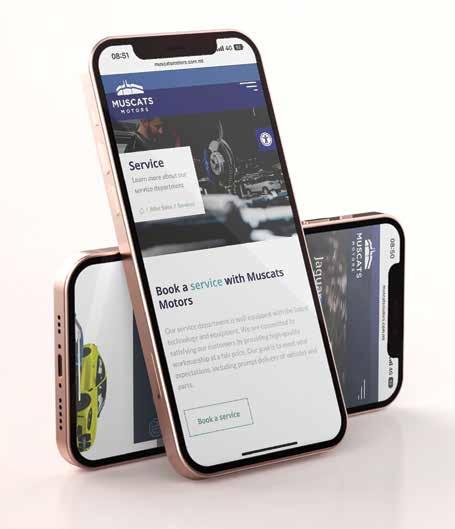
Elaborating, Mr Busuttil explains that, in addition to creating a digital space through which customers can discover the distributor’s myriad heritage brands – such as MINI, Jaguar, Land Rover and BMW – the platform also allows customers to book test drives and car services, and to request parts. “We’re excited about bringing our customers into the digital age with us. With this investment and the current digitisation plan, we aim to be ahead of the curve and stay relevant in today’s automotive market,” he says.
Muscats Motors are “always on the lookout for ways to improve our customer service; so, when we set out to innovate and create more streamlined processes, we knew digitisation was going to be a big part of that. As we began brainstorming what that would look like, one thing became clear: we needed a way for customers to communicate with us from their homes, on their own schedule,” he recalls, adding that the new site has become an extension of the company’s systems. “It isn’t just a nice-to-have tool; rather, it’s been integrated into our company’s overall goal to make sure that customers are more involved in all of our

processes and that these are as transparent as possible.”
The design of the site took three months to complete. “The process started by assessing our old website. It had limited functionality and the design was outdated,” Mr Busuttil explains. To progress with the project, the team at Muscats Motors held meetings with website development agency, NIU. “They explained what the current trends are and what would work best for us moving forward. We outlined our needs and wants, and made sure that the new website, in its foundational design, met all these requirements.”
63 BusinessNow Motoring
“We’ve been making big leaps to ensure that we are ahead of the curve with our latest innovations in the automotive industry.”
Mr Busuttil has nothing but praise for the team at NIU: “the process from inception to completion of the website was very smooth and there were no issues at all. The entire team was very professional, and communication was great. We were updated regularly on how the development of the website was progressing and they were always happy to answer any questions we had,” he says.
In the design of the site, several considerations were taken into account. “Firstly, we wanted it to be functional. The website is going to be used by a lot of people from different
departments and with different digital competences, so we wanted it to be easy to use. In this way, no matter who is using it, they can find what they need quickly and easily,” Mr Busuttil asserts.
The company also wanted their platform to be easily editable by the team at Muscats Motors. In other words, foreseeing the need to make changes, due to the large number of brands, products and services on offer, the site’s capabilities needed to be accessible to the team. “We needed it to be updated with new content, constantly. We didn’t want it to be a burden on our staff members – which it would have been had it been difficult to edit – and we didn’t want there to be any barriers in terms of making content available on the website.” This would allow the site to be continually refreshed: “This is especially important with news stories and product launches. We want people who visit our site on a regular basis to see new content.”
The overall concept of the platform also had to be clientcentric, he continues. “The customer journey was an important factor in the design of the website, as well as ensuring that we had a clear goal for each page on the site, that is to convert a visitor into a contact or a customer. We also wanted to create interest funnels on every page, directing our visitors towards contact pages and sign-up boxes. To achieve this stylish look while still being functional, we went with a modern, minimalistic approach,” he says. Functionality was also key, and, thus, the site was designed to ensure SEO prioritisation.
Throughout the process, the biggest challenge for the designers, Mr Busuttil states, was to ensure consistency in image, and to “align all the brand content into one uniform template. We wanted each company in our portfolio to be represented as a cohesive unit with its own identity, but to also achieve a high degree of consistency throughout the website. Thankfully, NIU has been working with us from day one and delivered a very well-executed project that functions as a unified body of work,” he explains.
Today, the site is up-and-running, and the company has seen the investment poured into the project pay dividends. “We have seen many advantages. We’ve been able to offer more information about the products and services that we

64 BusinessNow Motoring
“The customer journey was an important factor in the design of the website.”
Rebecca Tanti and Gianluca Busuttil (Muscats Motors Marketing Team)
offer, and we have also improved our ranking on Google so people can now find us more easily. We can also update it internally, making it easier for us to manage our own content and images. It’s been easy to use, reliable and secure,” he says. The platform has also been able to help the team track the efficiency of marketing campaigns launched, with the team able to determine which techniques have been the most effective at client attraction and retention. “This is especially useful when it comes to our social media activity, as we are able to assess whether our posts are working or not,” he says.
One of the key benefits has been the streamlining of the company’s customer relationship. “We are able to offer a more professional service to our customers. It’s easy for them to navigate around and find what they are looking for quickly. This
has given rise to an increase in sales because customers are able to find us easily online whenever they search for the products or services we offer,” he attests.
This forward-thinking approach will continue to be vital for a firm like Muscats Motors, as customers increasingly seek innovative solutions to transportation on the island. Indeed, as the brands continue to evolve – in response to changing market needs and global challenges – the ability to communicate firmly and efficiently with customers will ensure that appropriate solutions are being offered, as we head into a new era for the automotive industry.
To experience the new Muscats Motors website, visit muscatsmotors.com.mt

65 BusinessNow Motoring
Cyberpass’ hightech solutions deliver the impossible using Epic for Business
BY JEAN MARC ZERAFA
CYBERPASS IS A LEADING PROVIDER OF HIGH-TECH SOLUTIONS and a company that has become synonymous with asset monitoring and tracking in Malta over the years.
It was set up in 2001 by Anthony Farrugia to offer innovative technological solutions aimed at increasing efficiency and solving complex problems across a range of different sectors.

Specialising in the field of telematics – the science of monitoring different types of assets – the company prides itself on being able to make the impossible possible, an objective it would be unable to achieve were it not for its relationship with Epic.
Cyberpass works with clients in a range of different industries to provide services such as vehicle tracking, cold-store monitoring, point-of-sales systems, and server room monitoring.

66 BusinessNow Communications
PHOTOS
It relies on Epic to provide it with mobile voice and data, as well as its premium bandwidth, all of which ensure that Cyberpass’ systems run smoothly and without interruption.
“Epic offers us a reliable service which in turn allows us to offer a reliable service to our clients,” says Operations Manager Nicholas Farrugia.
“Just like a mobile phone, the devices we install in vehicles or cold stores all need to have a SIM card inside them. We use Epic SIM cards in our devices which allow them to send and receive the data needed by the system.”
Cyberpass uses Epic for all its connectivity requirements because it offers a secure and reliable service, as well as an unparalleled local and international network to ensure that its devices are always connected.
In addition to its exceptional infrastructure, Epic also brings to the table a business partner approach, giving them the peace of mind that they can depend on Epic’s support when problems arise.
“We’ve been working with Epic for 10 years. It’s a long time, and you form some good relationships over such a long period,” Anthony Farrugia says, adding that while some people might come and go, the core of the company, and its way of doing business, remain the same.
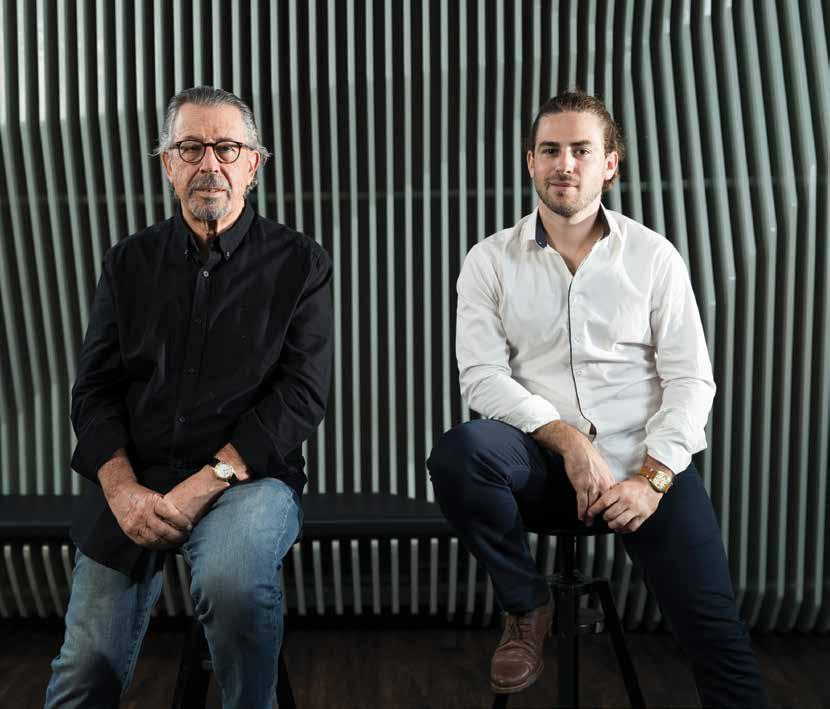
Epic has set itself the goal of creating the strongest network ever, a feat Mr Farrugia is convinced it will accomplish.
“I expect speed and dependability because it is at the very core of what we do,” he says. “It all hinges around one word: reliability.”
67 BusinessNow Communications
Anthony Farrugia, Managing Director and Nicholas Farrugia, Operations Manager
Maltese real estate: A safe haven in troubled times
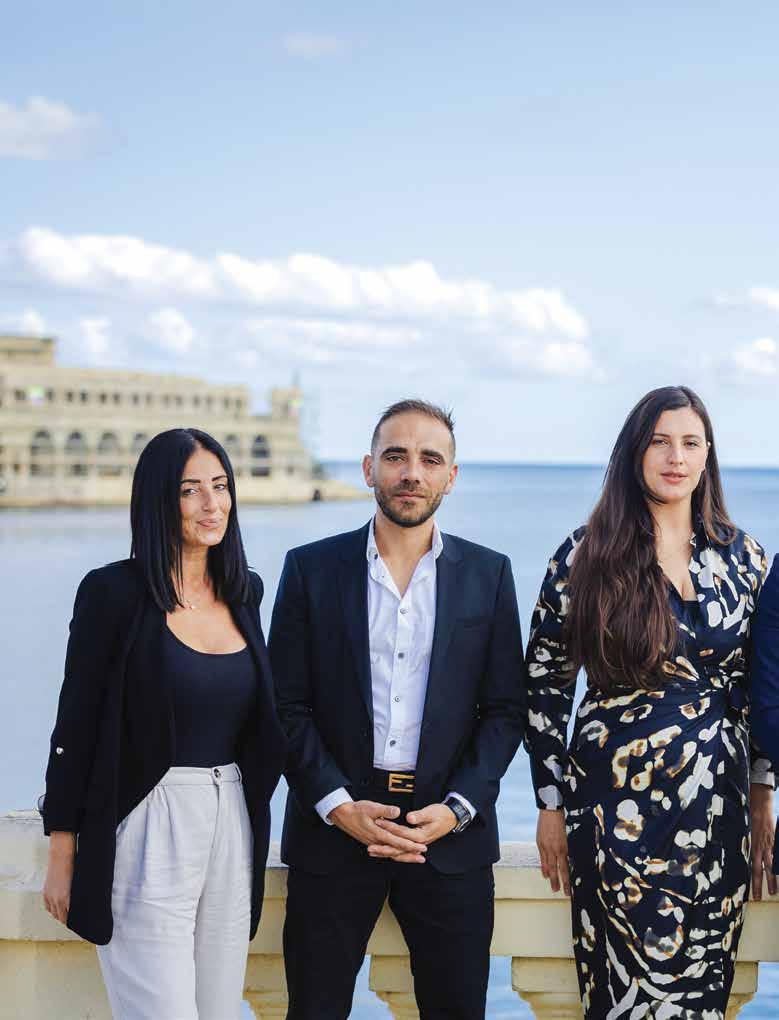
As global risk factors continue to increase, Real Agents CEO Justin Camilleri tells
Louis Fenech why Malta’s property market remains a safe investment
68 BusinessNow Property
Robert
PHOTOS BY INIGO TAYLOR
THERE IS NO SHORTAGE OF PROBLEMS
FACING THE WORLD TODAY. Price shocks associated with supply chain issues that are only slowly being resolved and an energy crisis caused by Russia’s invasion of Ukraine have led Central Banks to increase their base interest rates, creating a perfect storm of events that is seeing the global economy veering into recession.
Malta has typically avoided being dragged down by global developments, but could these gathering storms impact the local economy, and the property market by extension?
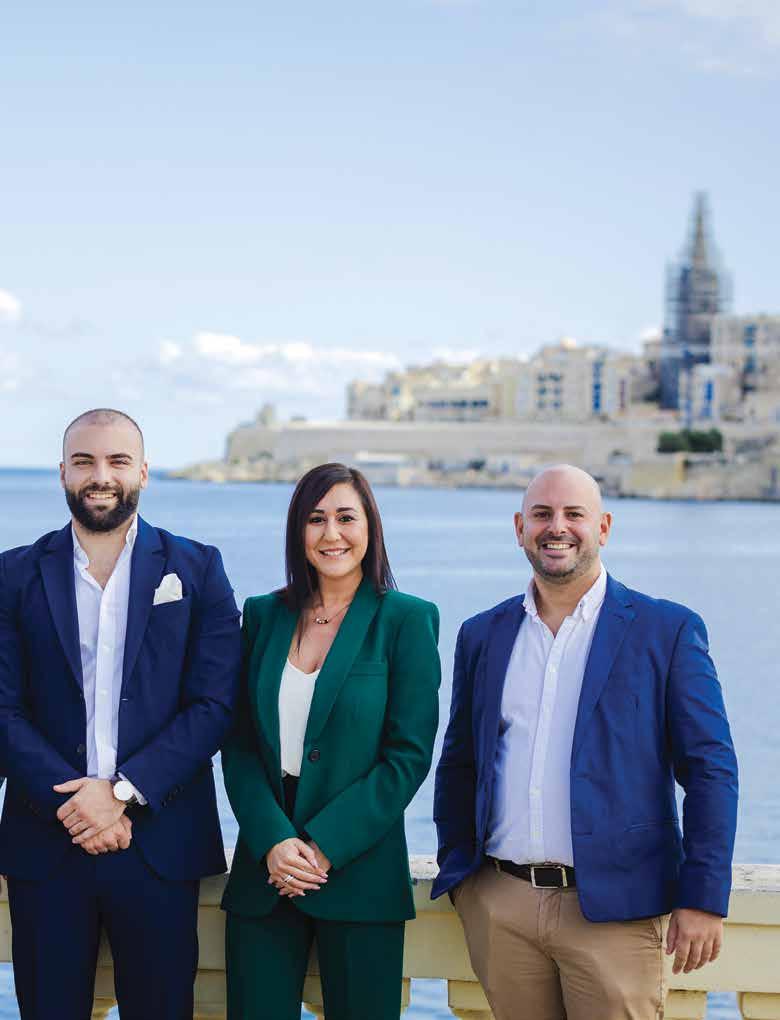
Justin Camilleri, CEO of Real Agents, is confident that no matter the strength of the storm, Maltese real estate will hold fast, pointing out that local property prices have never decreased by any significant amount.
“When I was young,” he says, “Malta was already the densest country in Europe, by a mile. And that was a Malta that was completely different to the country we have today. We’ve seen our population increase by a quarter in just 10 years. The demand is sky high, and the housing supply on a small island is what it is. Simply put, there is little to no chance that the real estate market will ever suffer a crash.”
Talk of a price bubble continues to crop up, on occasion, but, as Mr Camilleri notes, such speculation has been ongoing for the better part of a decade, with no indication that it has any basis.
“Over the next 20 years, the premium on land will only continue to increase,” he says, with ‘land’ here being a carefully chosen term that the experienced real estate consultant is happy to delve into.
69 BusinessNow Property
“Property having ownership of the full site – from the land to the airspace – is most likely to see the greatest appreciation over the medium term,” he says, “and it is currently at a discount. The time to invest is now, because that will not remain so forever.”
Asked to explain what he means by a discount, Mr Camilleri explains that the downside to many older homes, judged by today’s standards, is the lack of a garage, which is seen as an essential ‘must-have’ by many.
“In fact, we have seen garage prices skyrocket at a faster rate than other property types. What was once worth a few thousand today fetches €35,000.”
He continues: “homes without a garage therefore have a disadvantage in today’s market, but this may present an opportunity for those with a long investment horizon. The supply of land will continue decreasing, and those who have it may benefit from this, if they wait long enough.”
For those looking to live in the property, or perhaps rent it out, older builds may also throw up several inconveniences, from the lack of modern insulation to the increased cost of maintenance, all of which contribute to the great value-for-money presented by such opportunities, when compared to apartments.
Mr Camilleri explains that while certain properties could be valuable due to their potential for development, others, particularly those in Urban Conservation Areas, present other economic opportunities.
Over the last years, the interlinkages between the real estate and tourism sectors have grown stronger. The sharp increase in the number of tourists visiting the Maltese islands led many households to purchase their own investment property and make it available for short-let to take advantage of the high returns available.
However, as the COVID-19 pandemic ripped through the tourism sector, many owners put these shortlet properties on the long-let market, leading to a reduction, for a while, in average rental prices.
Tourist numbers are expected to make a full comeback by 2024, but by then another phenomenon will be impacting the market for tourist accommodation –the large number of hotel rooms expected to flood the market over the coming years, as estimated in a ground-breaking study published in October by audit firm Deloitte.
Mr Camilleri is doubtful whether the opportunities available in the latter half of the 2010s will ever make

70
BusinessNow Property
“Simply put, there is little to no chance that the real estate market will ever suffer a crash.”
a comeback, especially for those properties lacking in distinctiveness.
“As a tourist, I would prefer a taste of the local history and culture, touch the real Maltese stone, and not stay at a nondescript apartment like a thousand others. At least, not unless the modern offering has its own attractions, like a luxury finish or a great view.”
“The tourism value of an older property lasts far longer than its value as a residence,” he argues. “Lack of a garage is a deal breaker for many residents, but is practically inconsequential for a tourist. The attraction of such places is precisely because tourists can have a slice of life experience,” he says, adding that it this potential that can save Malta’s unique cultural heritage.
Inflows of capital do not happen in a vacuum, however, and have effects on the market that can be hard to stomach by younger generations looking for a place to call their own. The issue, Mr Camilleri asserts, is that people who were raised in, and grown accustomed to, large properties, need to lower their sights.
“We see young people used to life in their parents’ house looking for similarly sized properties, in the region of 200sqm. This kind of real estate today is priced in the region of €400,000. It is no longer suitable for the average first-time buyer.”
Being unacquainted with current realities is a sure path to disappointment, but Mr Camilleri believes that increasing the housing stock could alleviate these pressures.
He asserts that “we shouldn’t be afraid to go higher,” stressing that his is simply an idea from someone who would like to see an improvement in the contribution of the real estate sector to national life.
“Building taller developments and limiting excavation can be a win-win situation for everyone involved. Imagine having the ground and first floors, instead of basement levels, dedicated to parking,” he says. “Excavation is such a costly endeavour – financially, socially, and environmentally, that we should do our utmost to limit it to where and when it is simply unavoidable.”
While this is just an example, he says it is imperative that Government works closely with the Kamra tal-Periti to give more freedom in architectural design to keep improving the quality and aesthetic value of Maltese property.
Turning finally to the continuing growth of Real Agents, the agency he launched in 2020, Mr Camilleri recounts that
the firm is currently working on opening an office in Mosta while carefully expanding the team.
“Our vision has not changed. Our focus on experienced property consultants remains the same, and I am proud to say that all our agents, thanks to their long history in the sector, are able to provide unparalleled service to our clients.”
“Our commitment to innovation stands strong. We are an outward-looking team striving to bring the latest technology and developments to Malta, and the future looks bright.”
“Property having ownership of the full site – from the land to the airspace – is most likely to see the greatest appreciation over the medium term… and it is currently at a discount. The time to invest is now, because that will not remain so forever.”
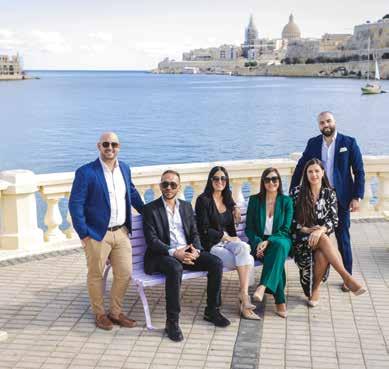
71
BusinessNow Property
BY JEAN MARC ZERAFA
Building a sustainable future on a 90-year legacy
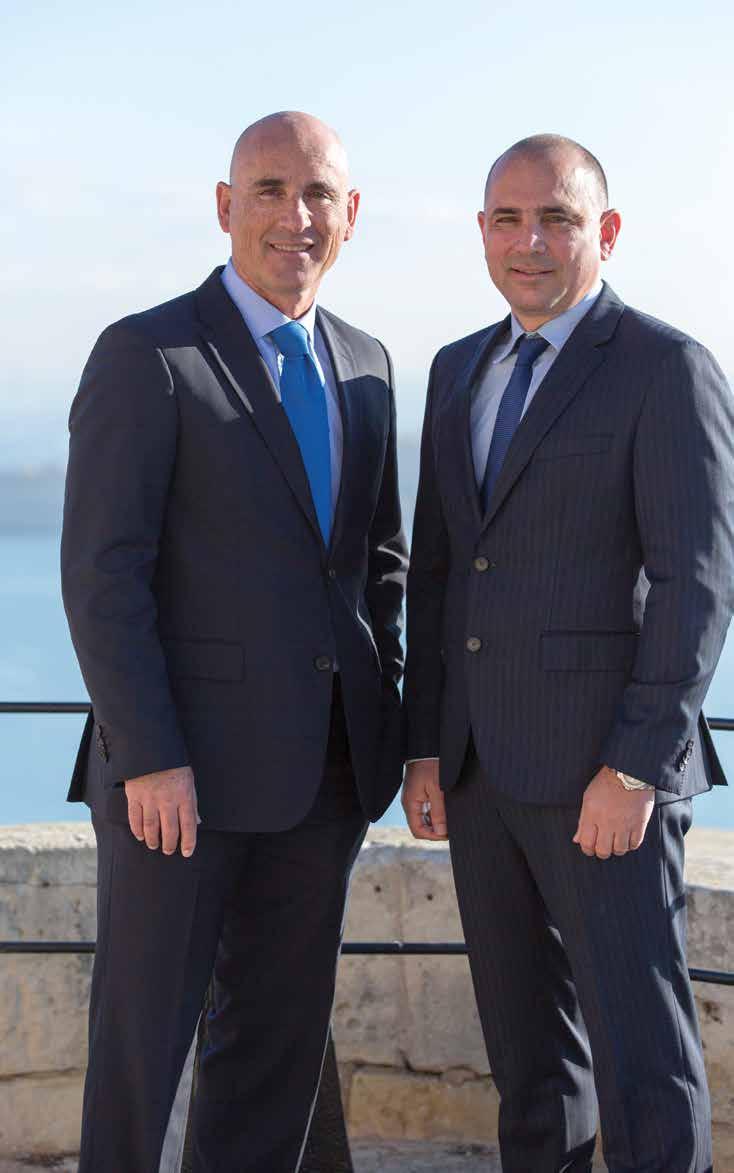
72 BusinessNow Industry Greats
PHOTO
Carmelo Abela Marketing is one of a shrinking number of local companies that has successfully stood the test of time and the many changes brought with it. Now under the leadership of the third generation, Martina Bartolo Parnis meets brothers and Directors, Steve and Pierre Abela, to find out about the company’s origins, its evolution and its plans for the future.
TO LEAD A FAMILY BUSINESS WITH A LEGACY JUST 10 YEARS SHY OF A CENTURY IS REMARKABLE, and somewhat of a privilege. Throughout its 90-year history, Carmelo Abela Marketing has grown steadily and pivoted when it was necessary to do so, to ensure its relevance and survival in an ever-changing business landscape.
Steve and Pierre Abela, Directors of Carmelo Abela Marketing, have been a part of the business since their school days, steadily climbing the ranks over the years to reach the position they have today. However, it was their grandfather, Carmelo Abela, who founded the business in 1932 with a small shop on Old Bakery Street, Valletta. It began by selling essential household goods, and Carmelo’s young wife, Giovanna, would lend a hand in the shop. Within a few years, and with a new location on West Street, they began selling food items, right before the start of World War II.

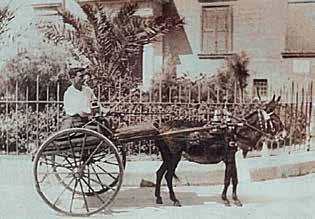
“Around this time, my grandfather, together with another company, entered the wholesale business. As food was being sold in rations, he saw a better chance of surviving in this line of business,” says Steve. “He would deliver staple foods, such as flour, rice and oil, with a horse and cart to the grocery shops. After a few years, he parted ways with the other company and continued the wholesale business alone.”
Carmelo and Giovanna Abela had two sons – the eldest, John, who would spend his time going around the shops to sell products after school or during holidays, and Joseph, Steve and Pierre’s father, who also joined the business once he came of age.
Between the late 1950s and early 1960s, the company underwent one of its first major changes, when it moved on from being a wholesale distributor to becoming an importer. “My uncle was noticing that, although the company had a good clientele,
73 BusinessNow Industry Greats
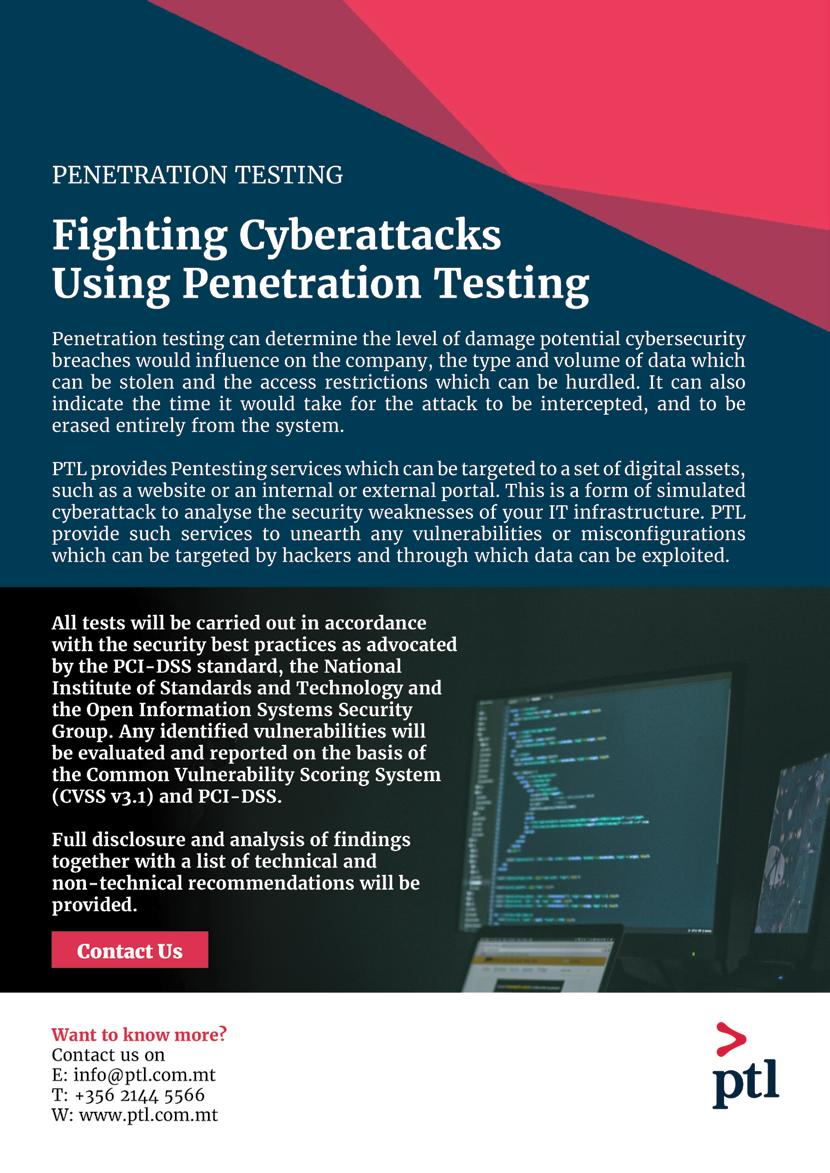
importers were going directly to the shops to sell their products, and so he saw the need for Carmelo Abela to start importing too,” says Steve.
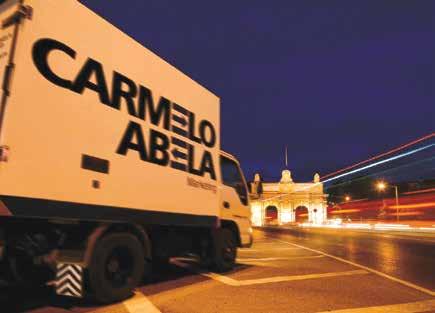
“He presented the idea to my grandfather, and while it wasn’t easy, he eventually convinced him to move forward in this direction. The first consignment that Carmelo Abela imported was rice in 50 kilo bags, and they sold it all before it even arrived in Malta. This gave them the confidence that they were on the right path.”
The company re-located again within the capital, to East Street, and here, business flourished, with Carmelo Abela soon becoming the exclusive distributor of the foods it imported, supplying both wholesalers and retail shops under the leadership of the second generation, Carmelo’s sons. “I joined the company around this time and started working at East Street, while my brother joined five years later,” says Steve. They both worked their way through every level of the company – loading trucks, cleaning stores, as messengers to deliver documents to the bank and customs, as cashiers, sales persons, sales managers and, eventually, directors.
As the business continued to grow, it moved out from Valletta with a team of around seven workers, to Marsa, where the staff complement grew to around 15 people. By 1992, the third-generation brothers became shareholders in the business after buying and splitting their uncle’s 50 per cent share, while their father owned the rest.
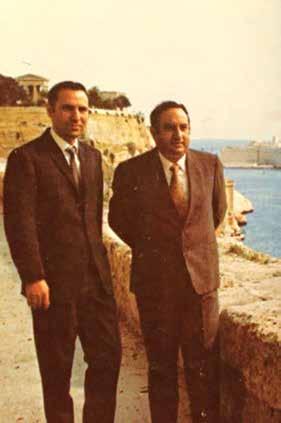
“In 1995, following health complications, my father wanted to put his mind at rest that the business was settled between
us, so we bought his share and became sole shareholders of the company with 50 per cent each,” says Steve. “Today, we are based in Mriehel and, together with another company, MacBake Importers, who we joined forces with, we have a team of around 80 dedicated people.”
Upon becoming shareholders in the business in 1992, Steve and Pierre saw its future heading in a new, different direction – which led to another of the company’s milestones. “During this time, we were still dealing with bulk products, selling 50 kilo bags of rice, five kilo tins of anchovies, and so on. We forecasted that, within a few years, the food business, in retail and other areas, would move into branded, prepacked products. From that point onwards, we searched for reputable brands and products to sell in Malta, rather than selling by weight,” they explain.
Their foresight certainly paid off. Today, Carmelo Abela’s portfolio of products has grown to include an extensive variety of widely known food and beverage brands, including Mutti (tomatoes), Parmalat (dairy products), Bonduelle (canned vegetables), Monini (olive oil), Parmareggio (Parmigiano Reggiano), Casa Modena (Italian cold meat cuts), Wyke Farms (cheddar) and Foxy (paper products).
75 BusinessNow Industry Greats
“[Carmelo] would deliver staple foods, such as flour, rice and oil, with a horse and cart to the grocery shops.”
Steve Abela
John and Joseph Abela
The Directors explain that, before the internet, they would generally discover new products during commercial breaks on Italian television channels. “I would write a name of a product on a piece of paper, look it up, find an address, write to the owners and travel to meet them. Once there, we had to persuade them that we were the right partner for them to do business with.”
The company’s longevity is not a matter of chance. Over the years, and especially since getting into the driving seat, Steve and Pierre have focused on lifting the company’s products range
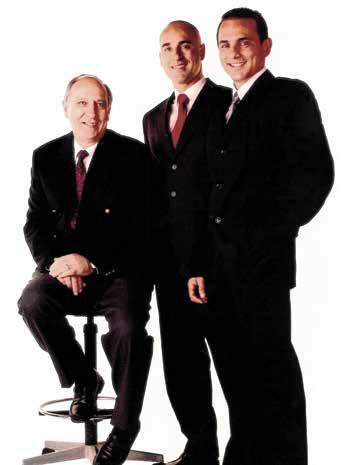
to offer only the best to their clients, coupled with an excellent service.
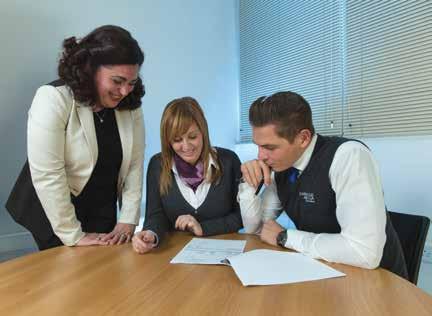
“Today, alongside supplying retail shops, which includes supermarkets and convenience shops, we also supply food service providers – hotels, restaurants and coffee shops –which have exploded in recent years. As Carmelo Abela, we guarantee the delivery of goods within 24 hours of receiving an order from any client in Malta and Gozo, be it in ambient, chilled or frozen temperatures, including on weekends for urgent orders. We believe this gives us an edge in our field.”
Another factor that has contributed to the company’s success is its people, without whom the company wouldn’t be where it is today. “Our people are a part of the Carmelo Abela family and this is how it has always been for us, even today, with a larger number of employees than when we started out,” says Pierre. “In addition, my brother and I experienced every level of employment in the company so we understand all our workers well.”
Pierre adds that, having met and done business with most of their clients since their time working in sales, their relationship is based on a history of mutual trust and respect. “My brother and I would meet shop and supermarket owners in person to tell them about new products, and over the course of many years, we became friends. Unfortunately, we don’t have the time to do this now but our sales team does a great job of keeping us in the loop about new developments. Knowing what’s going on around us is crucial to staying on top of the game.”
Sharing fond memories of their earliest years lending a hand in the business, the Directors say they were both very close to their grandfather, often spending weekends with him, learning the ropes and playing on his farm – especially Steve, who is the elder of the two. “I can say that a lot of what I learnt in my youth, I learnt from him: the discipline of sleeping early to wake up early, going to mass every day before work, not smoking and
76 BusinessNow Industry Greats
“Our people are a part of the Carmelo Abela family and this is how it has always been for us.”
Pierre Abela
Joseph, Steve and Pierre Abela
PHOTO BY JEAN MARC ZERAFA
drinking, even though my grandfather did! I’m nearly 60, and I still wake up earlier than I need to,” says Steve. “He doesn’t hear mass every day anymore though,” chimes Pierre, poking fun at his brother.
Working with their grandfather was a highlight of their childhood. Then, as the brothers got older, Carmelo took a step back from the business due to age, and they worked under the supervision of their father and uncle. Now, the Directors are pleased to see fourth-generation family members participate in the business. “Both our sons have been employed with Carmelo Abela for a few years now, and of course it is our hope that they, along with the rest of our children when they come of age, will continue taking the business forward.”
Since those early years, suffice to say that the local business landscape has changed considerably, and the challenges businesses face today are ever increasing. One challenge that Pierre singles out in his sector is parallel trading in retail, where local supermarkets import their own brands, while foreign supermarkets don’t buy anything at all from local importers. “There’s no doubt it has become harder to survive but, remarkably, we’re still growing, and we still have that hunger and drive to grow our business.”
Steve adds that the business is constantly changing and the secret to staying in the game, for any business and not just theirs, is to be flexible, open to change and not get stuck in their comfort zone. “We’re often told by the team that they’re amazed at how enthusiastic my brother and I are about work. It’s normal to start slowing down at our age, but we are still as excited by new opportunities and new business now as we were years ago.”
Looking ahead to the new year, the Directors are keen to mark the company’s 90th anniversary with the kind of recognition and celebration that it truly deserves. “We will be hosting a gala dinner in June 2023 and inviting our suppliers, most of which are also family-run businesses who we have a long history with. It would be a memorable experience to host them here, all together, once in our lifetime,” say Steve and Pierre.
“We are also looking forward to starting works on our new, state-of-the-art premises in Bulebel. This, we hope, will be our final move, which should be completed within two years. What we can say with certainty is that it will be an exciting and busy year for us and Carmelo Abela Marketing.”
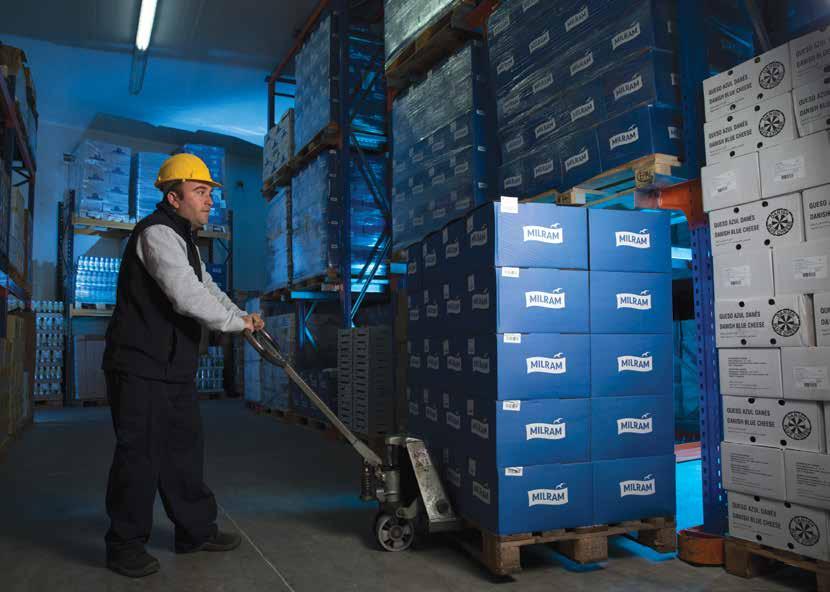
77 BusinessNow Industry Greats
PHOTO BY JEAN MARC ZERAFA
A taste of home
True foodies know the value of an authentic, no-frills experience, as it is often where the tastiest and most genuine fare can be found.

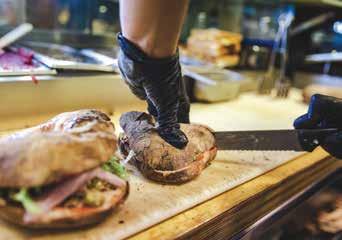
Sarah Muscat Azzopardi visits four local traditional eateries spread around Malta and Gozo that consistently deliver.
XUFI (Olympic) Café and Bistro
For those hailing from Mosta and its surroundings, a trip to the beaches in the north during the summer months simply isn’t complete without a stop-over at Xufi, or Olympic Bar, for a ftira first. Apart from their famous hobz biz-zejt, the café and bistro boasts a full menu of authentic dishes which means it’s rarely not teeming with people, regardless of the time of day.
“My father and grandfather started it together in 1963, and my siblings and I took it over some 20 years ago,” explains Chris Galea, who runs it today, together with his brothers Frankie and Alvin, and their sister Charlene.
78 BusinessNow Food & Drink
PHOTOS BY INIGO TAYLOR
Chris is in charge of the kitchen, while Alvin, Frankie and Charlene take care of the front of house, and whoever of them you run into on your visit, they’re always zooming around to keep up with demand. “Today, pasta dishes are among our most popular, apart from hobz biz-zejt – that’s really how we started out,” says Chris.
The menu was a lot simpler in the restaurant’s earlier days, he explains, revealing that it mainly consisted of pastizzi, qassatat, imqarrun il-forn and a simpler version of the hobzabiz-zejt. “We’d also make a lot of tea, as our clients were mostly workmen, fishermen and hunters,” he says, recalling how when he was a boy, Xufi was always full of people in the early hours of the morning, before they’d head out to hunt or fish. Nowadays, with a vaster clientele and wide-ranging tastes, the menu has grown to accommodate them – and the opening hours have become somewhat kinder!
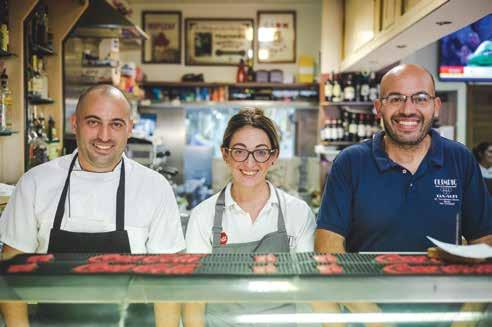
“Throughout the week, our pasta dishes, salads and breads are more popular, whilst at the weekend we serve an à la carte menu, which also features meat and fish. Sunday lunch is particularly busy among families, some of whom come every Sunday!”

In fact, it’s Xufi’s consistency, and the fact that you know what you’re going to get, that keeps people returning, according to Chris. “People come to us confidently, knowing that they will eat well,” he smiles, and the family’s passion for their work is immediately evident.
“We’ve spent our lives here, and the business is important to us – it’s a lot more than just our livelihood. As soon as each of us finished school, we joined the family business – it’s really the only thing we know! As we move forward, it’s a balance between keeping to our roots and traditions, and developing and evolving with the times, whilst keeping the consistency that people have come to know and love.”
79 BusinessNow Food & Drink
“We’d also make a lot of tea, as our clients were mostly workmen, fishermen and hunters.”
Tal-Furnar Restaurant and Bakery
Once upon a time, there were several traditional bakeries boasting a stone, wood-burning oven, along the streets of Malta and Gozo’s oldest villages. Today, most have closed down, but in Xaghra, Gozo, one such bakery has grown, and evolved into somewhat of an institution among locals: TalFurnar Restaurant and Bakery.
Run by the fourth generation in a long line of bakers, the bakery is 130 years old, and now operates mainly as a home-style restaurant that delivers the kind of genuine, heart-warming fare many will associate with their childhood on the islands.

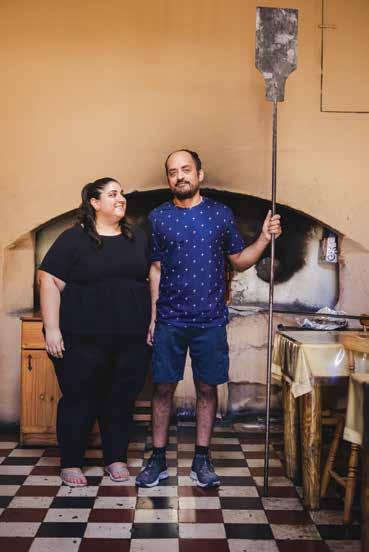
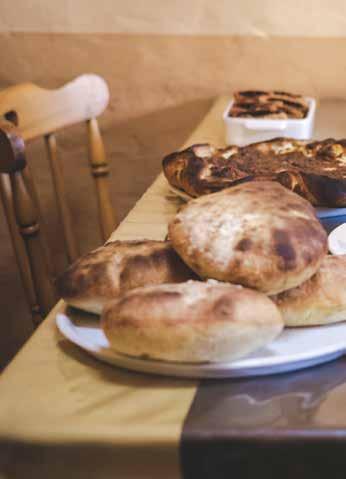
“We are a family of bakers, and the bakery was started by my great grandfather, though his father was also a baker before him,” smiles the friendly Anna Marie Vella, who is at its helm today, together with her husband John. She has recently taken the business over from her father, whose idea it was to open the restaurant alongside the original bakery some 18 years ago.
Up until two years ago, it was open as a fully operational bakery, but since then, they’ve cut back on the bakery side of the business to focus on the restaurant, yet still make bread to order. “We still use the original stone oven my great grandfather built,” she explains, and in the kitchen, Anna Marie is proud of the fact that everything is made by hand. “We don’t have machines, and use the natural mother dough for our bread.”
This approach extends far beyond the bread, she continues, to the restaurant’s well-loved dishes, including Gozitan ftajjar, as well as the dishes they slow cook in the oven, like lamb, suckling pig and pork cheeks. “We don’t make anything in bulk, and always add specialities, so the menu is constantly evolving and changing. We also make
80 BusinessNow Food & Drink
“The bakery was started by my great grandfather, though his father was also a baker before him.”
our own ravioli, stuffed with Gozo cheese or rabbit. My mum came up with the idea of the rabbit ones, which are fried, and we kept them on the menu, as everybody loved them,” she says.
Apart from the magic of the stone oven, the authentic taste of the dishes here is also down to the produce – John has his own farm, which supplies the restaurant with lamb, rabbit and fresh cheese, instilling a farm to table concept.

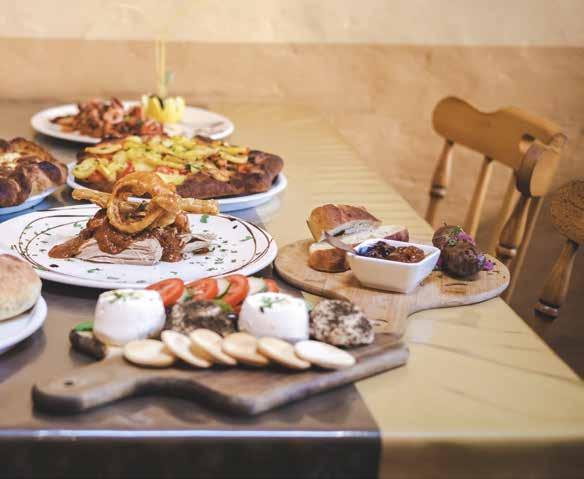

The wood for the oven is also especially supplied, largely by several of John’s carpenter friends, who provide offcuts from their work, often in exchange for a ftira or two! Harking back to the bakery’s past, Anna Marie reflects that this practice actually recalls life during the war, which her

mother reminisces about. “The bakery was quite a hub at the time. During the flour ration, villagers would come to make their own bread at the bakery, and my family would cook it for them. They would pay for it with wood for the oven,” she explains.
It is this beautiful family atmosphere and dynamic, coupled, of course, with the food, that keeps customers coming back for more. “For us, it’s important to give people a good experience – a genuine smile makes all the difference, and makes people feel at home,” smiles Anna Marie, who also has plans for taking her family traditions into the future. “We try to keep it as authentic as we can, while also striving to make it better. For example, we’ve recently started organising bread-making and ftira-making activities, to help share our heritage with visitors and children who visit us on school outings. In today’s busy lifestyle, people don’t have time to spend hours cooking, so it is really reminiscent of a traditional way of life.”
81 BusinessNow Food & Drink
Qrendi Bocci Club
When one thinks of the southern village of Qrendi, the first associations that likely spring to mind are the Neolithic temples of Mnajdra and Hagar Qim, but a poorly concealed secret local foodies have come to know should also make the list: the homely, traditional restaurant at the Qrendi Bocci Club.
Qrendi Bocci Club has been around for almost 40 years, and Manuel (Leli) Sciberras was one of the many that would play bocci there. Then, 19 years ago, he decided to take it over, together with his brother. “Back then it was a bar, and we used to serve appetisers, like the type you’d find in local village bars and kazini, until one day a couple of our customers asked me to serve them rabbit,” Leli recalls. From that rabbit, things evolved organically, until the brothers decided to turn the bar into a restaurant.
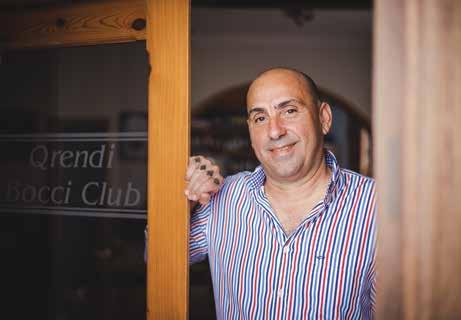
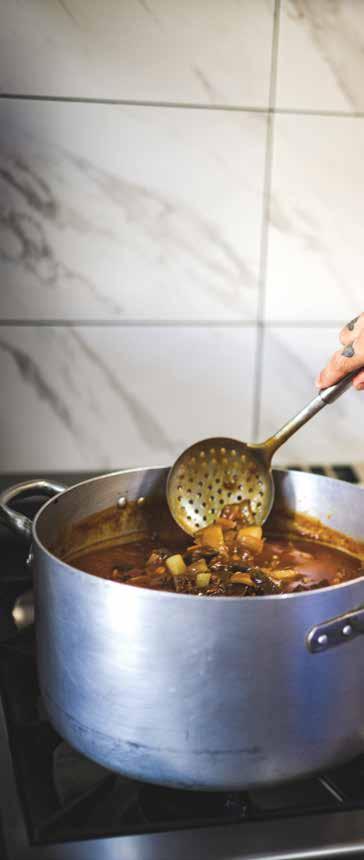
“I’m not a chef, but I learned to cook from my parents, who are both great cooks – real, genuine food. In fact, when we began cooking here, we made a variety of appetisers, all using a regular oven like you’d have in your kitchen at home,” the affable Leli laughs. “My brother was more keen on keeping it as a bar, but I won in the end, and we stopped doing appetisers and set it up as a restaurant.”
Looking back on those early days, he reflects, “I wanted to be known for rabbit, not because I don’t know how to cook
82 BusinessNow Food & Drink
other things, but that is the focus I wanted for the restaurant, and nowadays it’s rare to find restaurants specialising in only a few dishes.” Such was his conviction that today, the menu at Qrendi Bocci Club is purposely limited, focusing on Leli’s specialty dishes: rabbit, horsemeat, snails and, more recently, rib eye.
And since the beginning, Leli has been involved in every aspect of the kitchen, cooking everything himself. He also buys the rabbit and butchers it, insisting that it’s local, so it’s no surprise that he’s adamant on
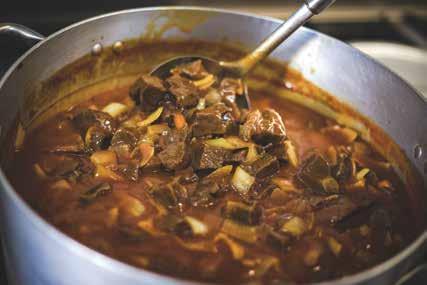

cooking and serving everything fresh: “I’ve been here for 19 years and I’ve never frozen a rabbit. I believe that in business you have to be a gentleman. The money people pay for the food is genuine, so the product you give them needs to be genuine.”
Asked what his top priorities for the restaurant are, he doesn’t mince his words: “I believe in cleanliness, genuine food, and being a gentleman, and I think that is where the restaurant’s success lies.”
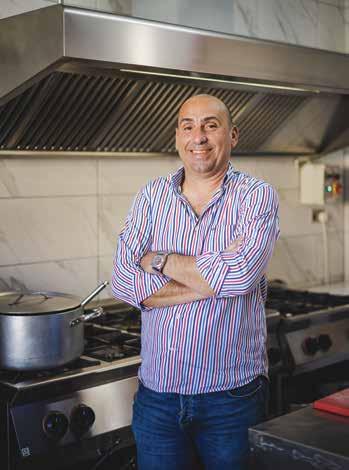
“I’m not a chef, but I learned to cook from my parents, who are both great cooks – real, genuine food.”
83 BusinessNow Food & Drink
Mgarr United Bar & Restaurant

The agricultural village of Mgarr is known to many for its rabbit restaurants, where families and groups of friends have flocked for years to enjoy a traditional fenkata. Among the restaurants that are celebrated for the quality and authenticity of their food, and rabbit in particular, is Mgarr United Bar & Restaurant, the restaurant of the Mgarr football club – and chef and owner Joel Tabone has a lot to do with that.
Born and bred in Mgarr, Joel got his start in the industry at just 14 years old, washing dishes in a well-known local restaurant at the time. Looking back on the beginning of his journey, he admits, “I’ve always liked the kind of genuine restaurants that have something for everyone,” and, after studying and working abroad for some time, he returned to his hometown to put his skills to good use.
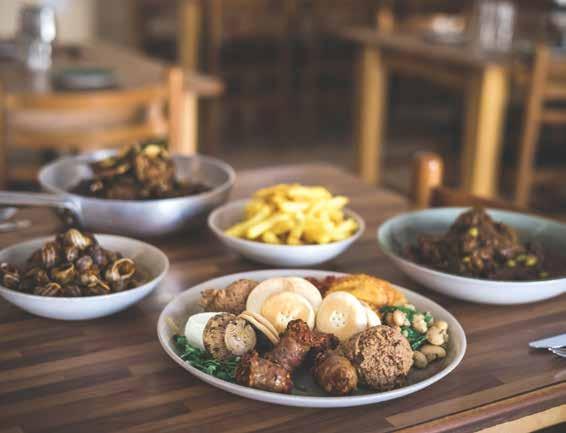

He took over Mgarr United eight years ago, together with his partner Paul Camilleri, but you likely won’t see much of Joel in the restaurant, and that’s just the way he likes it – the kitchen is truly his domain, where Joel really excels.
“I take care of all the prep and cook everything myself,” he explains, adding that he only has help with plating. We are mostly known for our rabbit dishes, horsemeat and snails. I cook the rabbit on order, and never make it in advance. I cut it up beforehand, but cook it there and then,” Joel says, crediting the atmosphere, genuine prices and consistency in the quality of the food with what keeps people coming back. “The only complaints I’ve had are that it can take some time to
84 BusinessNow Food & Drink
get the food to the table, but that’s because I insist on cooking everything fresh,” he asserts.

Many of the ingredients in his dishes are, like the chef himself, products of Mgarr, so they don’t have to travel far. “I source some of the produce from a farmer who grows Mediterranean thyme (saghtar) almost exclusively for us, with the amount I ask him for,” Joel laughs, revealing the one ingredient which he believes makes the rabbit dish extra special.

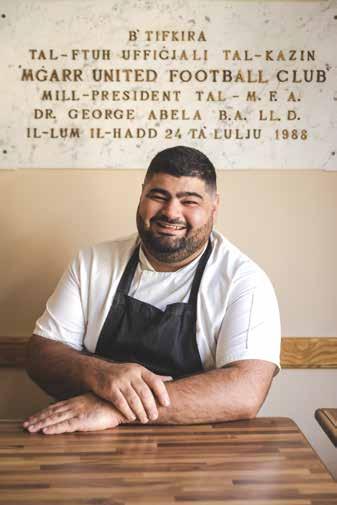
“We source almost everything from the village,” he smiles, making a sweet mention of a local lady, now in her 70s, who collects and supplies many of the snails for the traditional dish.
“She delivers up to 20 kilos a week, and I really appreciate the hard work of people like her.” Meanwhile, the Maltese sausage is also made for the restaurant by a butcher close by, and the cheeselets (gbejniet) are sourced from Mgarr farmers, as is much of the fresh produce, making the dishes here a true celebration of the agricultural village that’s home to both restaurant and chef.
85 BusinessNow Food & Drink
“I source some of the produce from a farmer who grows Mediterranean thyme (saghtar) almost exclusively for us, with the amount I ask him for!”
A journey of discovery
Sarah Muscat Azzopardi delves into the artistic world of Wallace Falzon, and how each piece is a form of internal expression to the artist, for whom art is akin to therapy.
“I’m an introvert, but through art I found the medium to express myself.”
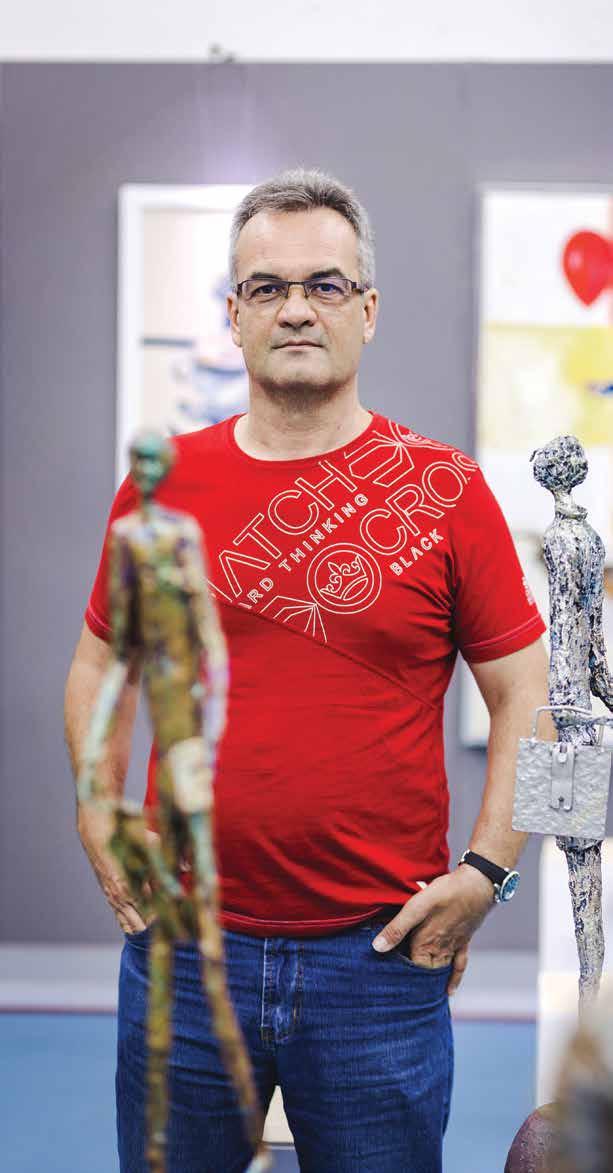
86 BusinessNow Meet the Artist
AS I’M SHOWN AROUND THE VERITABLE ALADDIN’S CAVE THAT IS WALLACE
FALZON’S STUDIO, stepping over salvaged materials destined for use in future works and admiring piece after piece in an eclectic collection which take on several distinct forms –and tell different stories – I am surprised to learn that the artist’s journey into art only started in earnest some 10 years ago.
It’s a story that is representative of what beauty can stem from tragedy, and one that Wallace tells quietly and with humility.
“At 45 years old, I was diagnosed with a rare, chronic autoimmune condition that affects my nerves,” he begins, likening receiving the news to being hit by a train. At the time, he had a thriving business career, serving as company director within the local business sphere, but his diagnosis led him to reasses what he wanted out of life, and instilled a yearning to better express himself. The medium which would enable him to do this, he discovered, was art.
“I’m an introvert, but through art I found the medium to express myself. I began taking care of myself psychologically, through the expression of art, and realised I had enough of my business life,” he reveals, admitting, “working
for the numbers becomes like an addiction that is difficult to get away from. If I had not fallen ill, I likely wouldn’t have considered making this radical change.”
Being completely self-taught, Wallace started with the medium of painting, before moving on to sculpture. For this reason, his collections are very eclectic, in that he doesn’t feel bound to any one style.

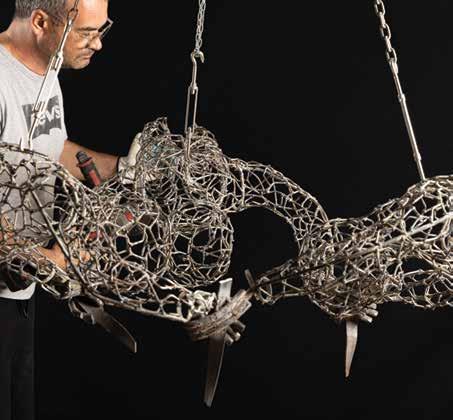
He started out humbly, painting on anything he could find – from gypsum boards to recycled paper. “From there, I made it my mission to start recycling everything, so the majority of artwork you see here utilises a variety of materials such as glass and recycled construction material like cement boards,” Wallace continues, admitting that while it’s much more labour intensive, and likely not viable for everyone, it makes it all the more satisfying. This extends to frames, which are often made of recycled pallet wood, he continues.
“I developed my own style from there. In this way, I use my lack of classical art training to my advantage – risk was part of my nature, and I feel comfortable with it, and now feel that anything can be developed into art,” he maintains, pointing out one piece, which, as its base, utilises
87 BusinessNow Meet the Artist
“Each piece tells a story – I don’t create art to make ‘pretty pictures’.”
PHOTO BY INIGO TAYLOR
PHOTO BY ANDREW ZARB

I feel I can’t work, I do a self-portrait and try to portray that mood. What’s interesting is that, once you portray that feeling and it’s down on the canvas, it’s externalised, and you’re released from it.”
an old street sign which had been trampled by cars.
As we continue our chat, he highlights another sculpture, Home is Where the Anchor Drops, explaining that the main material used in this piece is a complete salvaged chain and anchor from the sea. It also features a net, crafted out of welded construction nails.

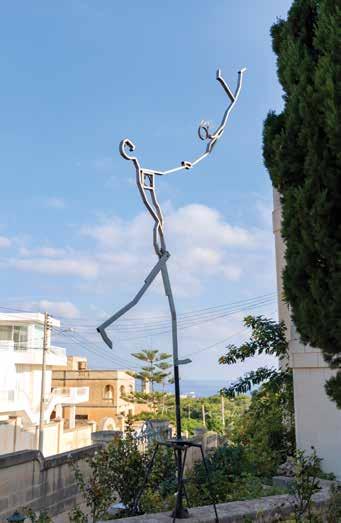

Since starting out, Wallace has exhibited his work at four solo exhibitions and taken part in a few collectives. Throughout, his work has continued to be largely autobiographical, featuring subject matter related to current affairs, or specific situations which stick out to the artist. “Each piece tells a story – I don’t create art to make ‘pretty pictures’. Even when I’m in a good mood and choose to paint a landscape, for example, there’s always some emotional connection to it.”
Detailing his creative process, Wallace says that he starts every morning “with a feeling that I need to do something.” This could be a thought, and can often change as he embarks on the process, from when he starts working on it to the finished result. “I
often don’t create a blueprint or design for a finished piece as it comes straight from my head, which can be tricky to convey in larger projects and structures, for which I need help to put heavier pieces together. My own perspective of the final product is very clear, but I can understand how it can be frustrating to others who are working with me,” he shares.
Inspiration, he says, can be found everywhere, and when he’s not feeling particularly inspired, he turns to self-portraits as an intriguing form of therapy. “When I feel I can’t work, I do a self-portrait and try to portray that mood. What’s interesting is that, once you portray that feeling and it’s down on the canvas, it’s externalised, and you’re released from it.”
His medical condition also plays a part in his artistic process, and today, he has learned to take it in his stride. “I receive treatment monthly, and utilise this time to reflect and further educate myself, so no time is wasted. My work also expresses the period at which it is created,” he explains, revealing that in the immediate period before he receives each treatment, his control over his right hand is
89 BusinessNow Meet the Artist
“When
PHOTO BY INIGO TAYLOR
PHOTO BY ANDREW ZARB
limited as a result of his condition, and the work produced during that time is more expressive, with finer details being left for after the treatment. “It has become part of my schedule,” he smiles sagely.
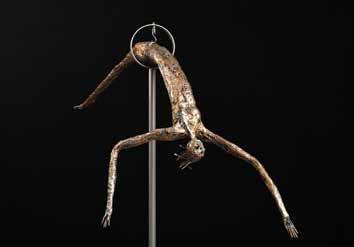

Apart from exhibiting his work and receiving recognition from the local artistic community, Wallace considers being commissioned to work on his first public monument, commemorating the elderly who lost their lives during the COVID-19 pandemic, as an important milestone in his journey so far. Revealing the process and his thoughts behind the monument, which was unveiled in Sliema earlier this year, he says, “when I was approached by the Maltese Association of Gerontology and Geriatrics to create this monument, I immediately gave them my idea for it, and they were impressed enough to commission it. I wanted to do something contemporary but figurative, so as to appeal to both sides of the art community, and it took several months to construct. I did it all at cost price, because of the voluntary nature of the organisation, and was very pleased with the result.”

Imbuing a few words of advice to aspiring artists, Wallace details the importance of working on a daily basis. “If you’re a Sunday painter, you’ll never get out of your comfort zone. Artists have to be very honest when it comes to their work – if it does not reflect the true self, then you are just producing pretty pictures and it stops there. Art has to be an internal expression, with the freedom that you don’t care what people think about your work.”
As for what lies ahead for Wallace, well, he says, “the sky is the limit. If you work, opportunities will come. As long as I am able to operate, I will continue. The future is production, for as long as I feel fit.”
90 BusinessNow Meet the Artist
“Art has to be an internal expression, with the freedom that you don’t care what people think about your work.”
PHOTO BY INIGO TAYLOR
PHOTO BY INIGO TAYLOR
PHOTO BY ANDREW ZARB

